David Graeber Famous Quotes
Reading David Graeber quotes, download and share images of famous quotes by David Graeber. Righ click to see or save pictures of David Graeber quotes that you can use as your wallpaper for free.
The question we should be asking is not why people are sometimes cruel, or even why a few people are usually cruel (all evidence suggests true sadists are an extremely small proportion of the population overall), but how we have come to create institutions that encourage such behavior and that suggest cruel people are in some ways admirable-or at least as deserving of sympathy as those they push around.
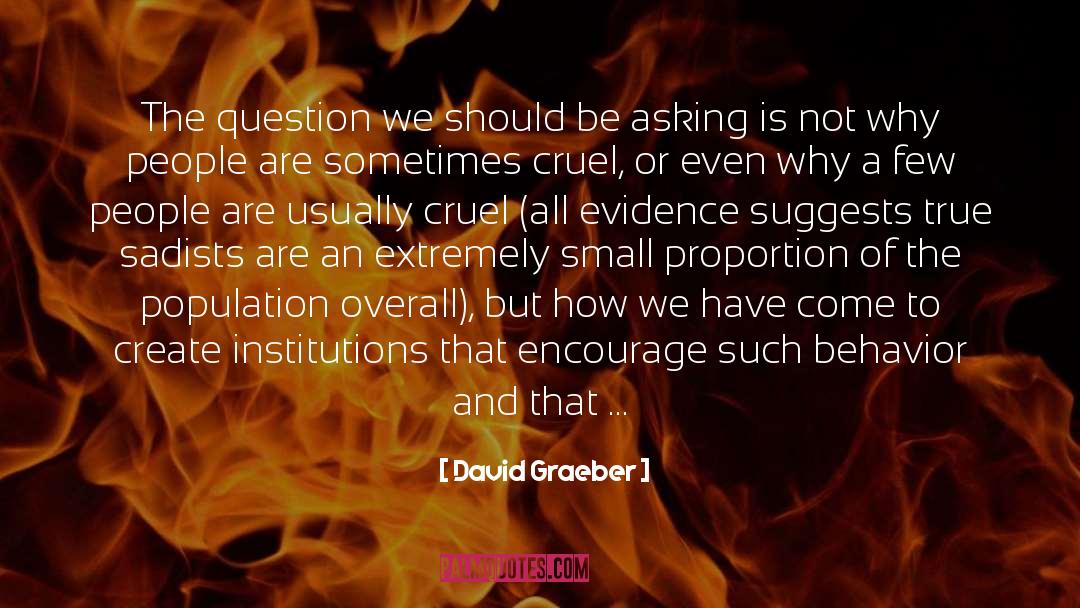
We are watching the beginnings of the defiant self-assertion of a new generation of Americans, a generation who are looking forward to finishing their education with no jobs, no future, but still saddled with enormous and unforgivable debt.
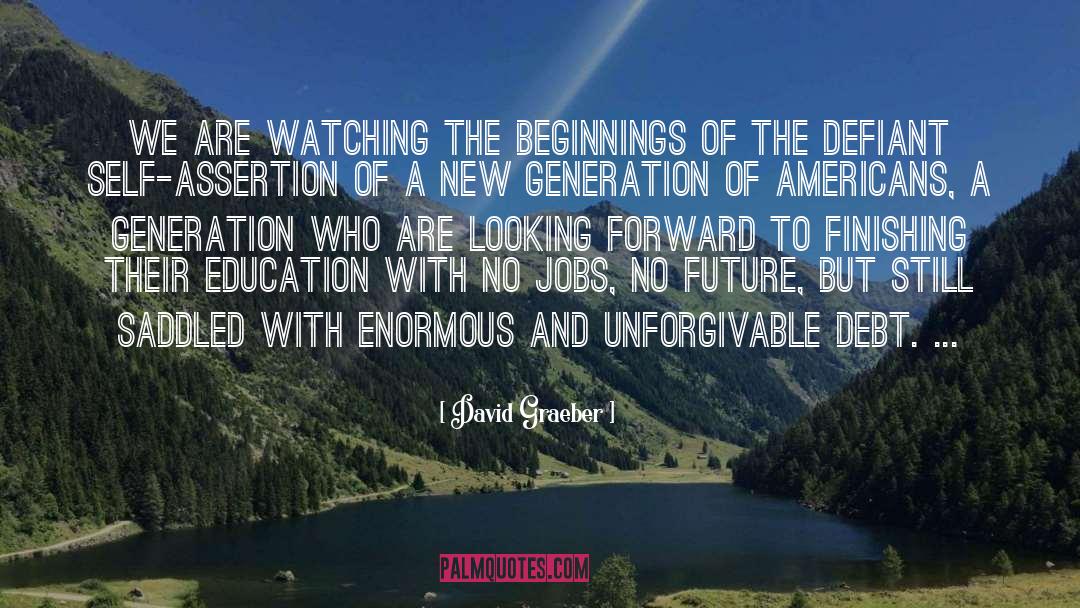
All rich countries now employ legions of functionaries whose primary function is to make poor people feel bad about themselves.
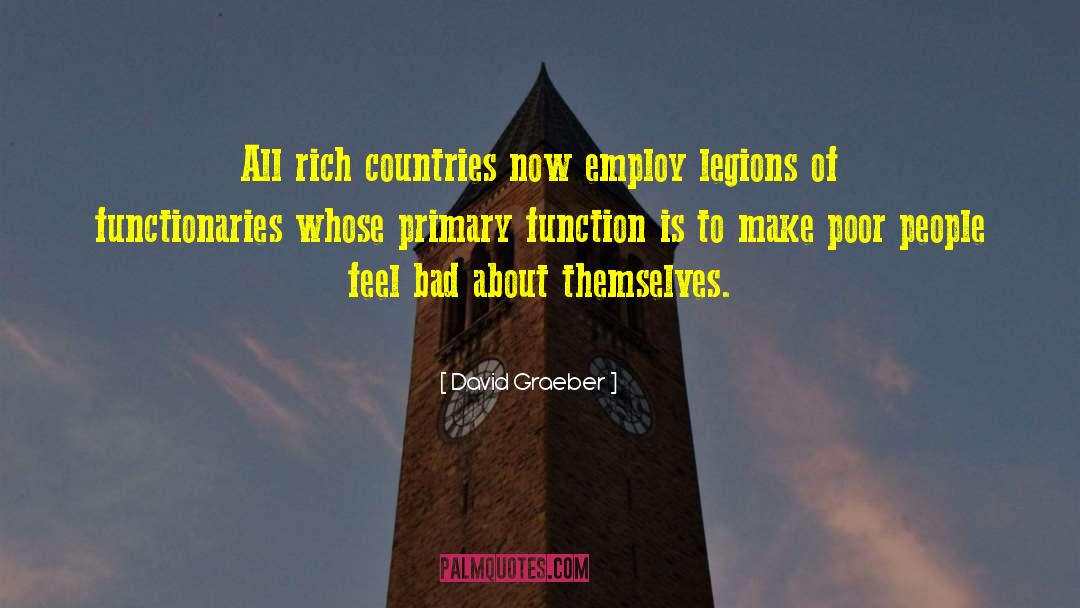
It may be true that, if I could con-
vince everyone in the world that I was the King of France, I would in
fact become the King of France; but it would never work if I were to
admit that this was the only basis of my claim. In this sense, politics
is very similar to magic - one reason both politics and magic tend, just
about everywhere, to be surrounded by a certain halo of fraud.
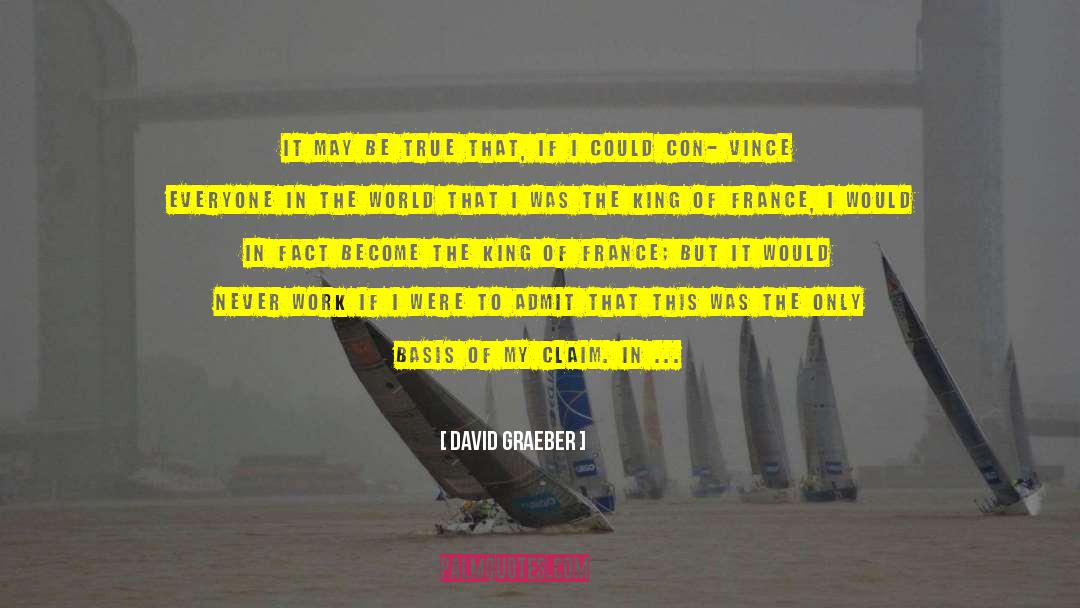
In a sense, those critics who claim we are not working a fifteen-hour week because we have chosen consumerism over leisure are not entirely off the mark. They just got the mechanics wrong. We're not working harder because we're spending all our time manufacturing PlayStations and serving each other sushi. Industry is being increasingly robotized, and the real service sector remains flat at roughly 20 percent of overall employment. Instead, it is because we have invented a bizarre sadomasochistic dialectic whereby we feel that pain in the workplace is the only possible justification for our furtive consumer pleasures, and, at the same time, the fact that our jobs thus come to eat up more and more of our waking existence means that we do not have the luxury of--as Kathi Weeks has so concisely put it--"a life," and that, in turns means that furtive consumer pleasures are the only ones we have time to afford.
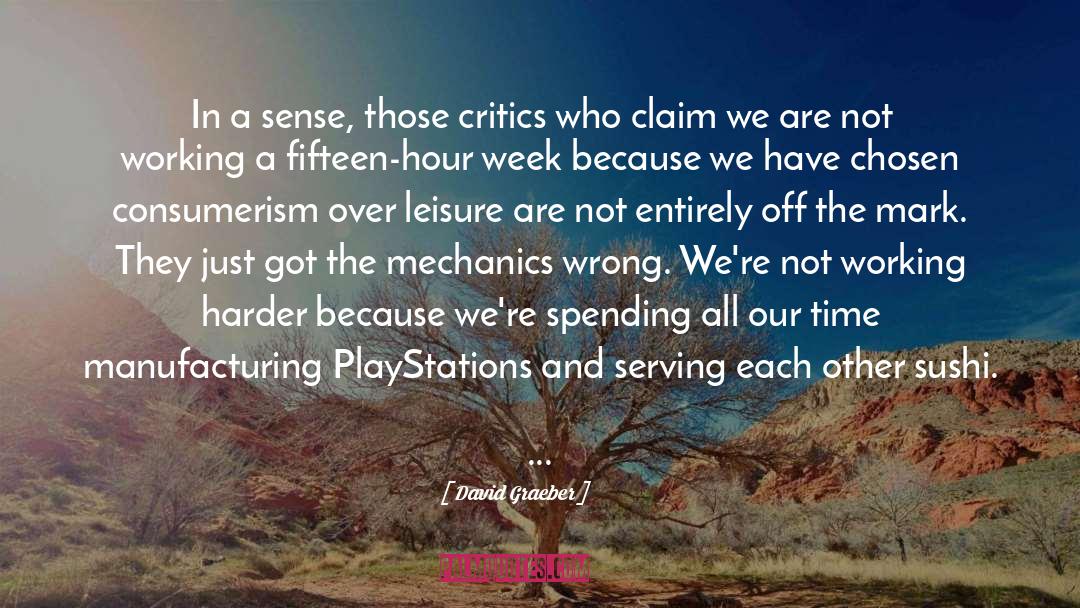
I think if the general exodus that seems to be going on occurs it's going to be a disaster,.

A human being unable to have a meaningful impact on the world ceases to exist.

The organization of the Soviet Union was directly modeled on that of the German postal service.
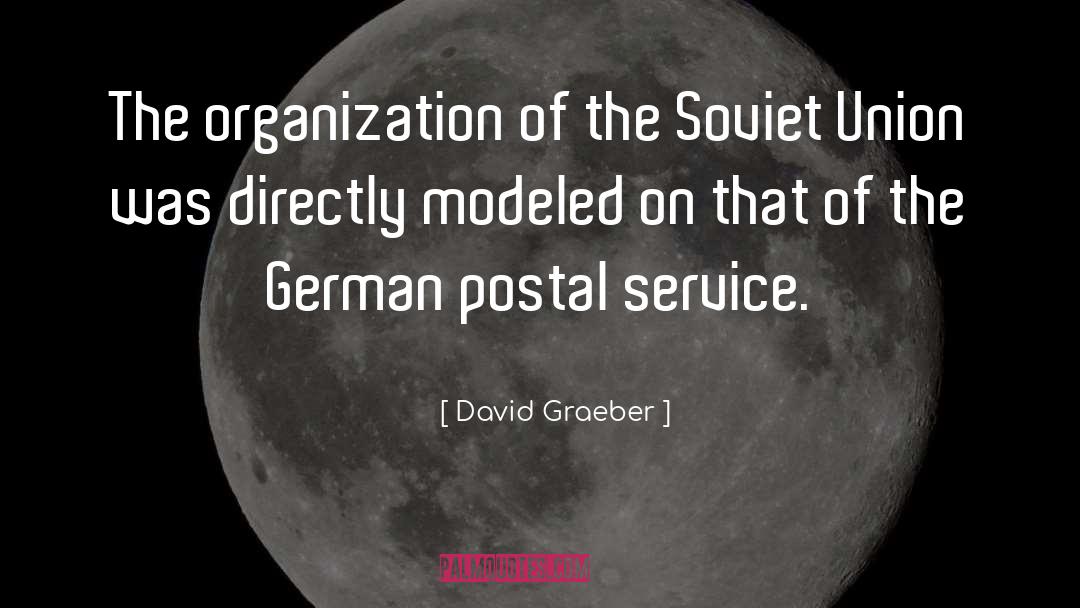
There was a time when academia was society's refuge for the eccentric, brilliant, and impractical. No longer. It is now the domain of professional self-marketers. As for the eccentric, brilliant, and impractical: it would seem society now has no place for them at all.
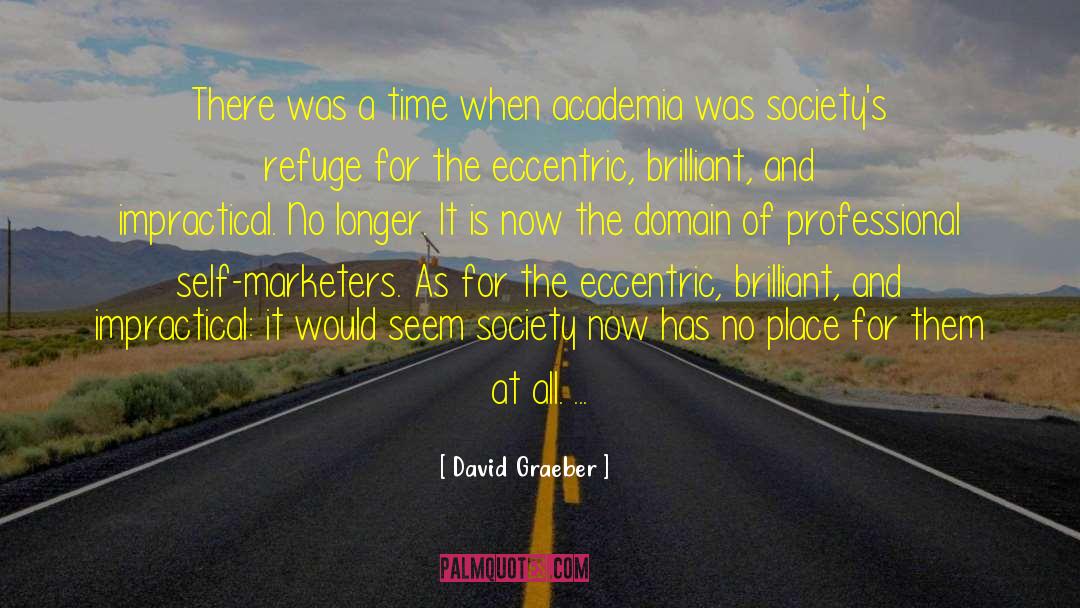
[A] great embarrassing fact ... haunts all attempts to represent the market as the highest form of human freedom: that historically, impersonal, commercial markets originate in theft.
![David Graeber Quotes: [A] great embarrassing fact ... David Graeber Quotes: [A] great embarrassing fact ...](https://palmquotes.com/author/david-graeber-quotes-1520240.jpg)
While opposing injustice nonviolently, he (Gandhi) insisted, is always morally superior to opposing it violently, opposing injustice violently is still morally superior to doing nothing to oppose it at all.

In America, the fifties were the heyday of a certain ideal of the one-income patriarchal family, and among the more affluent, the ideal was often achieved. Women with no access to their own income or resources obviously had no choice but to spend a great deal of time and energy understanding what their menfolk thought was going on.
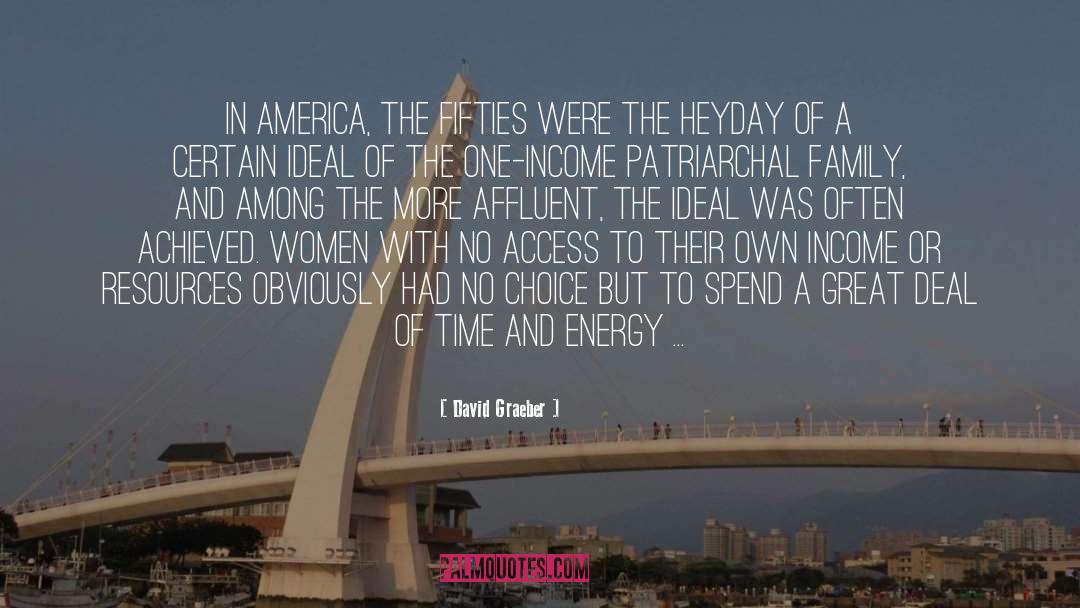
All of this would explain why revolutionary moments always seem to be followed by an outpouring of social, artistic, and intellectual creativity. Normally unequal structures of imaginative identification are disrupted; everyone is experimenting with trying to see the world from unfamiliar points of view; everyone feels not only the right, but usually the immediate practical need to re-create and reimagine everything around them.
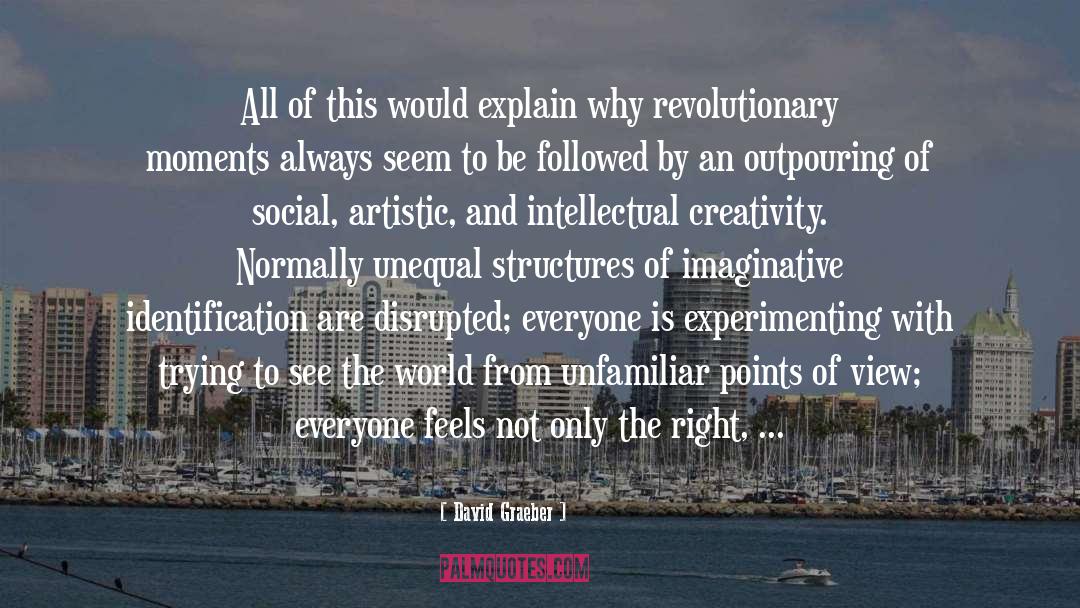
This is of course why violence is so often the preferred weapon of the stupid. One might even call it the trump card of the stupid, since (and this is surely one of the tragedies of human existence) it is the one form of stupidity to which it is most difficult to come up with an intelligent response.
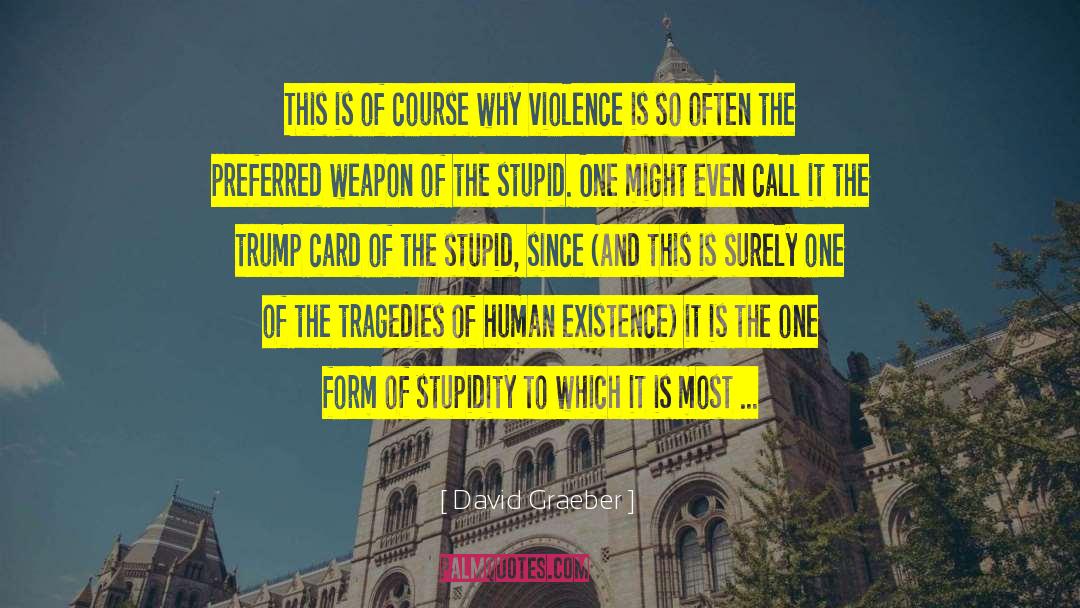
In American prisons, which are extraordinarily violent places, the most vicious form of punishment is simply to lock a person in an empty room for years with absolutely nothing to do. This emptying of any possibility of communication or meaning is the real essence of what violence really is or does.

From the perspective of sixties radicals, who regularly watched antiwar demonstrations attacked by nationalist teamsters and construction workers, the reactionary implications of corporatism appeared self-evident. The corporate suits and the well-paid, Archie Bunker elements of the industrial proletariat were clearly on the same side. Unsurprising then that the left-wing critique of bureaucracy at the time focused on the ways that social democracy had more in common with fascism than its proponents cared to admit. Unsurprising, too, that this critique seems utterly irrelevant today.*
What began to happen in the seventies, and paved the way for what we see today, was a kind of strategic pivot of the upper echelons of U.S. corporate bureaucracy - away from the workers, and towards shareholders, and eventually, towards the financial structure as a whole.
__________
*Though it is notable that it is precisely this sixties radical equation of communism, fascism, and the bureaucratic welfare state that has been taken up by right-wing populists in America today. The internet is rife with such rhetoric. One need only consider the way that 'Obamacare' is continually equated with socialism and Nazism, often both at the same time.

top-down chains of command are not particularly efficient: they tend to promote stupidity among those on top and resentful foot-dragging among those on the bottom. The greater the need to improvise, the more democratic the cooperation tends to become.
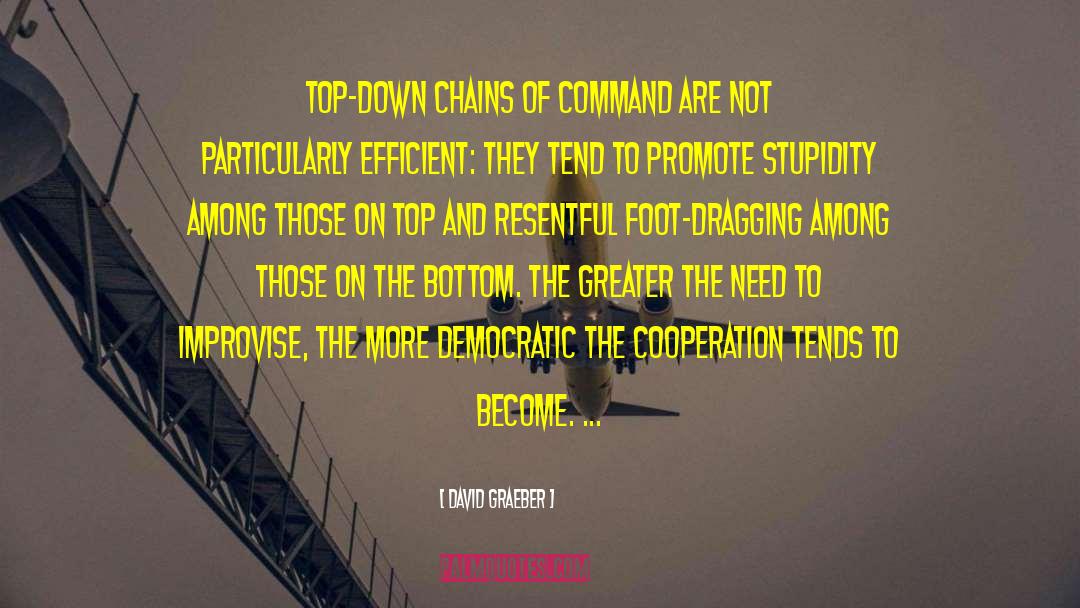
The criminalization of debt, then, was the criminalization of the very basis of human society. It cannot be overemphasized that in a small community, everyone normally was both a lender and borrower. One can only imagine the tensions and temptations that must have existed in a community - and communities, much though they are based on love, in fact because they are based on love, will always also be full of hatred, rivalry and passion - when it became clear that with sufficiently clever scheming, manipulation, and perhaps a bit of strategic bribery, they could arrange to have almost anyone they hated imprisoned or even hanged.
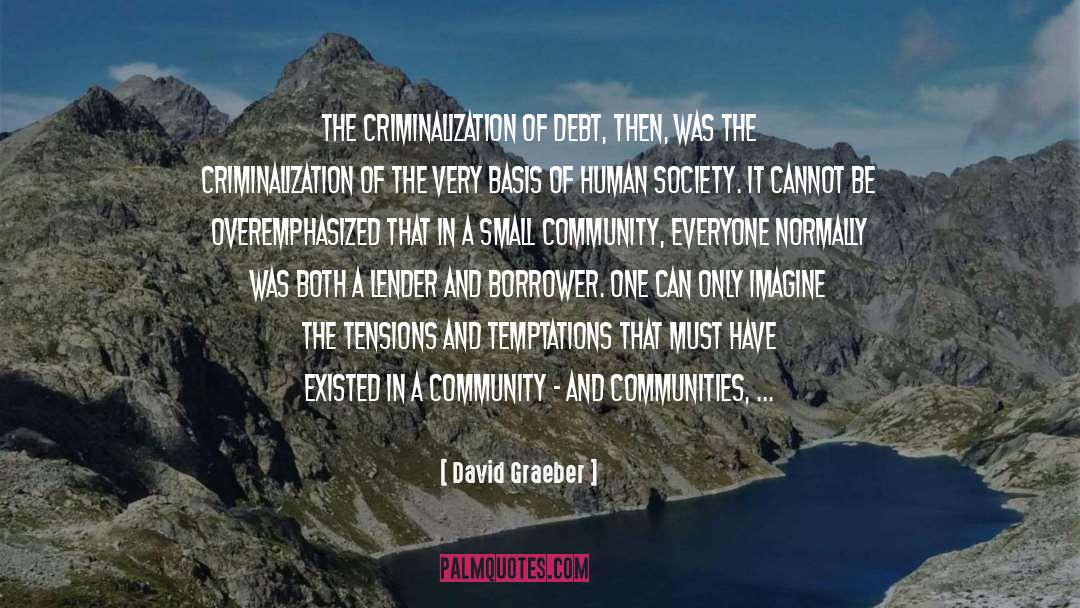
The police can use violence to say, expel citizens from a public park because they are enforcing duly constituted laws. Laws gain their legitimacy from the Constitution. The Constitution gains its legitimacy from something called 'the people.' But how did 'the people' actually grant legitimacy to the Constitution? As the American and French revolutions make clear: basically, through acts of illegal violence. So what gives the police the right to use force to suppress the very thing–a popular uprising–that granted them their right to use force to begin with?

The definitive anthropological work on barter, by Caroline Humphrey, of Cambridge, could not be more definitive in its conclusions: No example of a barter economy, pure and simple, has ever been described, let alone the emergence from it of money; all available ethnography suggests that there never has been such a thing.

If we're going to actually come up with robots that will do our laundry or tidy up the kitchen, we're going to have to make sure that whatever replaces capitalism is based on a far more egalitarian distribution of wealth and power - one that no longer contains either the super-rich or desperately poor people willing to do their housework. Only then will technology begin to be marshaled toward human needs. And this is the best reason to break free of the dead hand of the hedge fund managers and the CEOs - to free our fantasies from the screens in which such men have imprisoned them, to let our imaginations once again become a material force in human history.
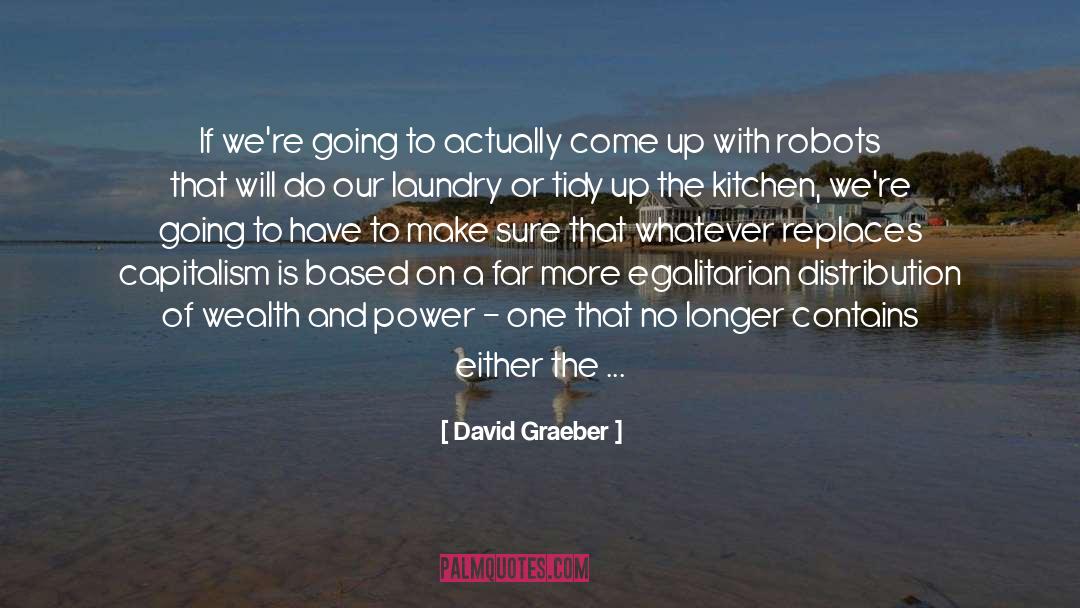
In the largest scheme of things, just as no one has the right to tell us our true value, no one has the right to tell us what we truly owe.
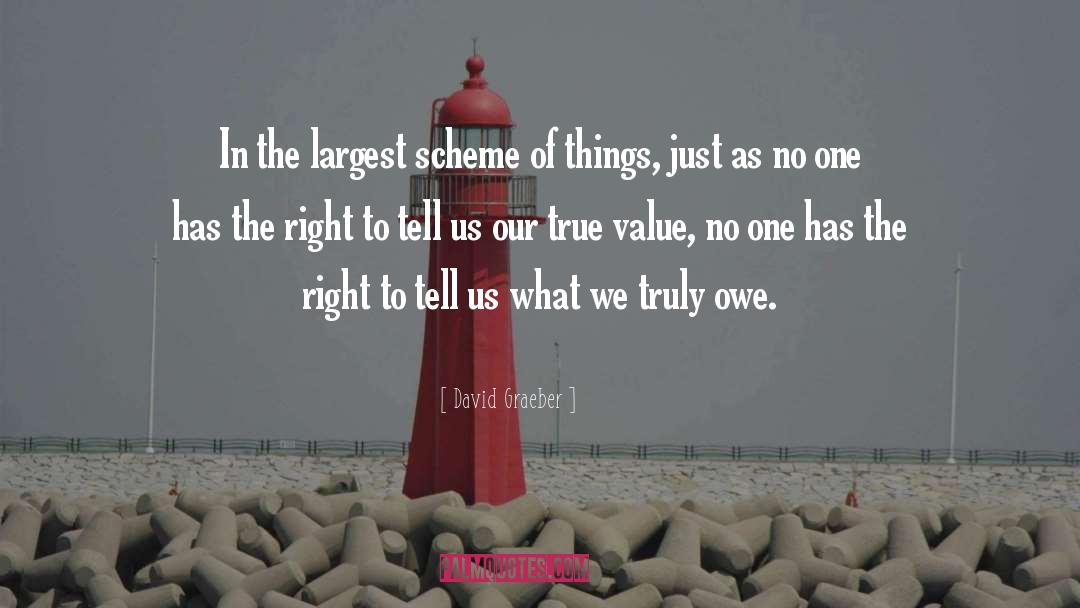
Apple Computers is a famous example: it was founded by (mostly Republican) computer engineers who broke from IBM in Silicon Valley in the 198os, forming little democratic circles of twenty to forty people with their laptops in each other's garages.
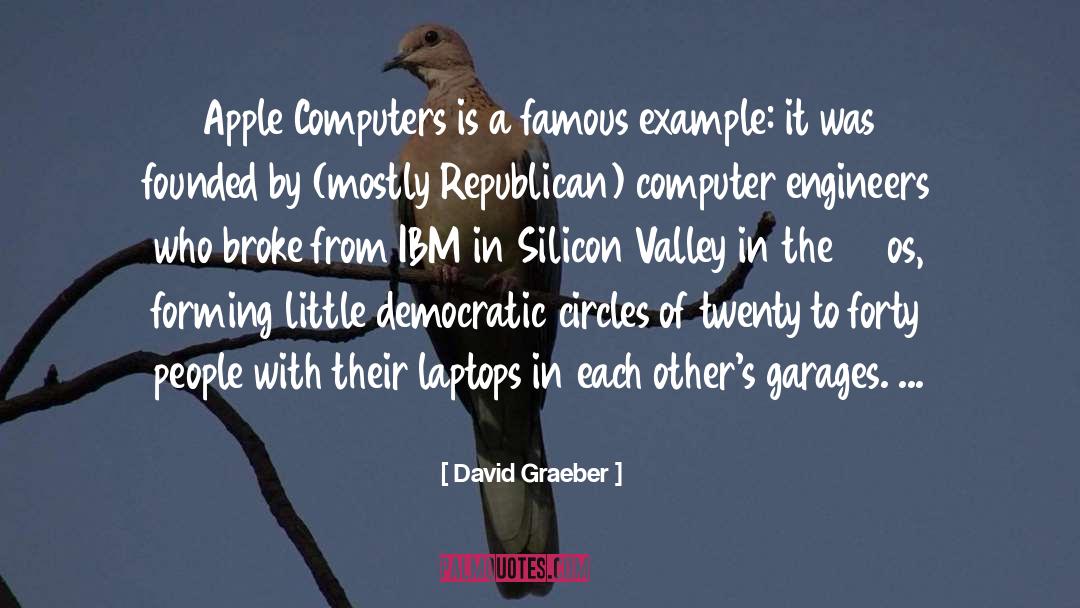
Power makes you lazy.

Credit Theorists insisted that money is not a commodity but an accounting tool. In other words, it is not a "thing" at all. For a Credit Theorist can no more touch a dollar or a deutschmark than you can touch an hour or a cubic centimeter. Units of currency are merely abstract units of measurement, and as the credit theorists correctly noted, historically, such abstract systems of accounting emerged long before the use of any particular token of exchange.
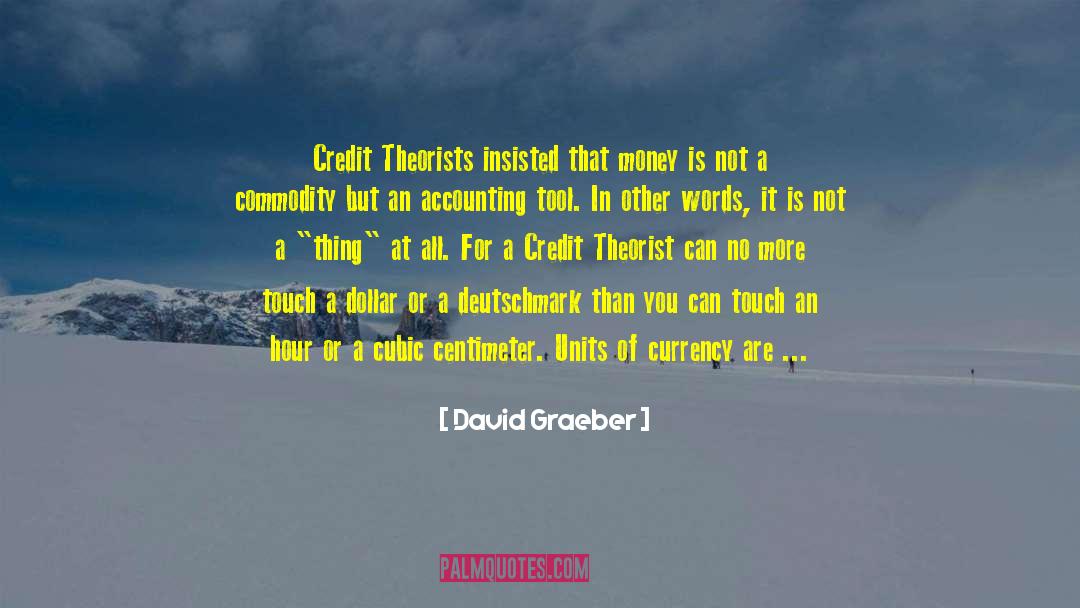
Young people in Europe and North America in particular, but increasingly throughout the world, are being psychologically prepared for useless jobs, trained in how to pretend to work, and then by various means shepherded into jobs that almost nobody really believes serve any meaningful purpose.
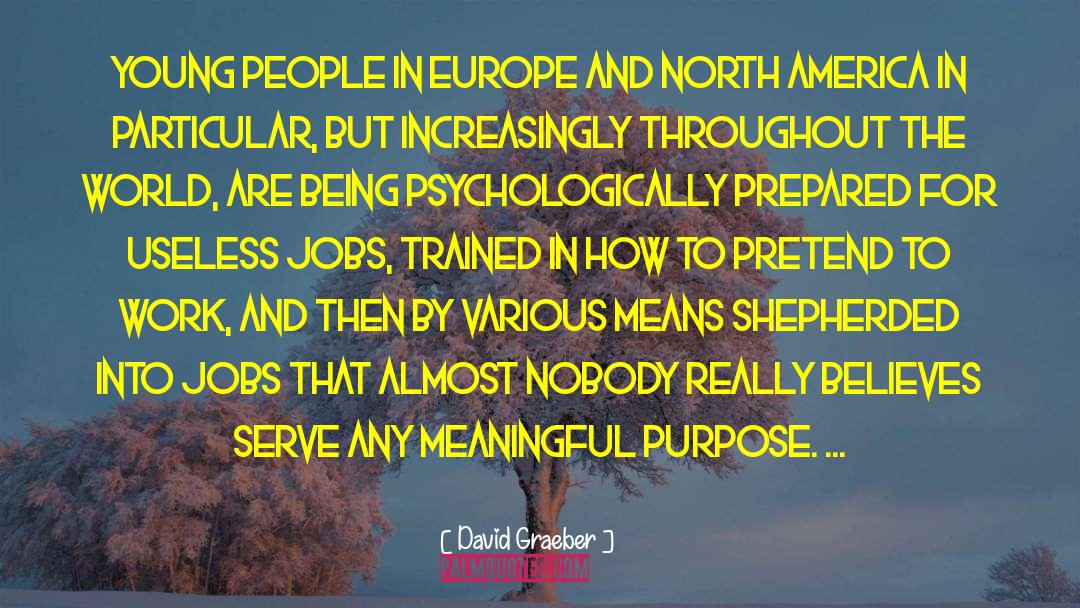
Consensus isn't just about agreement. It's about changing things around: You get a proposal, you work something out, people foresee problems, you do creative synthesis. At the end of it, you come up with something that everyone thinks is okay. Most people like it, and nobody hates it.
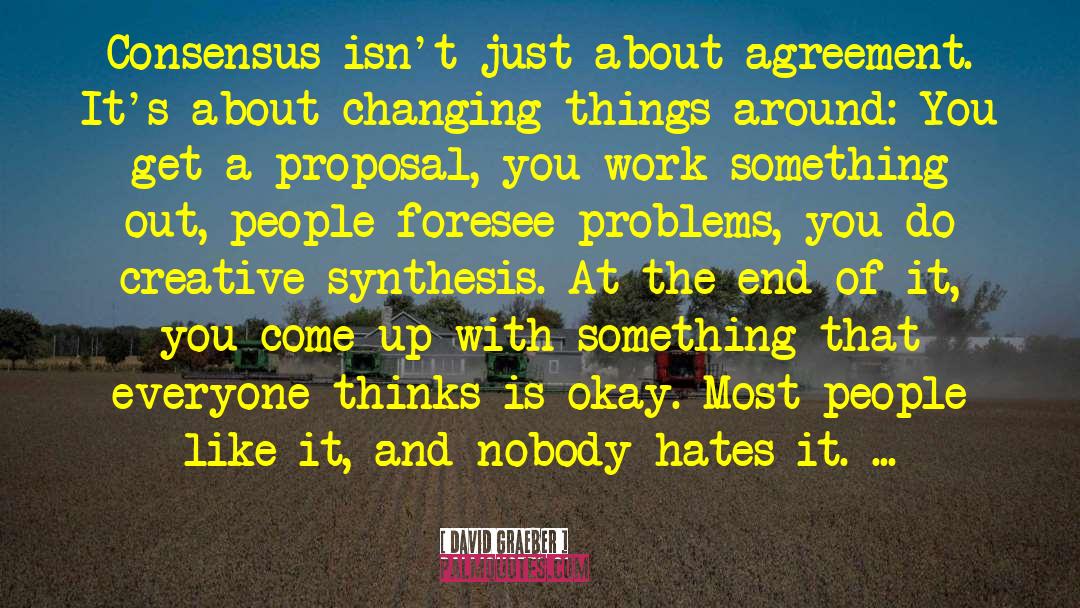
We are usually told that democracy originated in ancient Athens - like science, or philosophy, it was a Greek invention. It's never entirely clear what this is supposed to mean. Are we supposed to believe that before the Athenians, it never really occurred to anyone, anywhere, to gather all the members of their community in order to make joint decisions in a way that gave everyone equal say?

Student loans are destroying the imagination of youth. If there's a way of a society committing mass suicide, what better way than to take all the youngest, most energetic, creative, joyous people in your society and saddle them with, like $50,000 of debt so they have to be slaves? There goes your music. There goes your culture. There goes everything new that would pop out. And in a way, this is what's happened to our society. We're a society that has lost any ability to incorporate the interesting, creative and eccentric people.
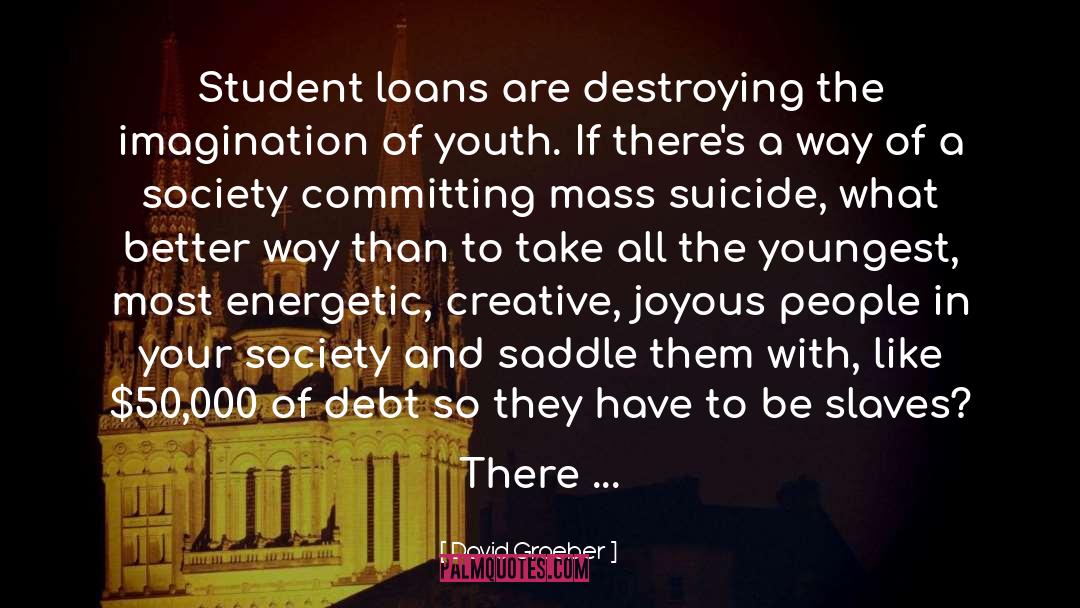
If taxes represent our absolute debt to the society that created us, then the first step toward creating real money comes when we start calculating much more specific debts to society, systems of fines, fees, and penalties, or even debts we owe to specific individuals who we have wronged in some way, and thus to whom we stand in a relation of "sin" or
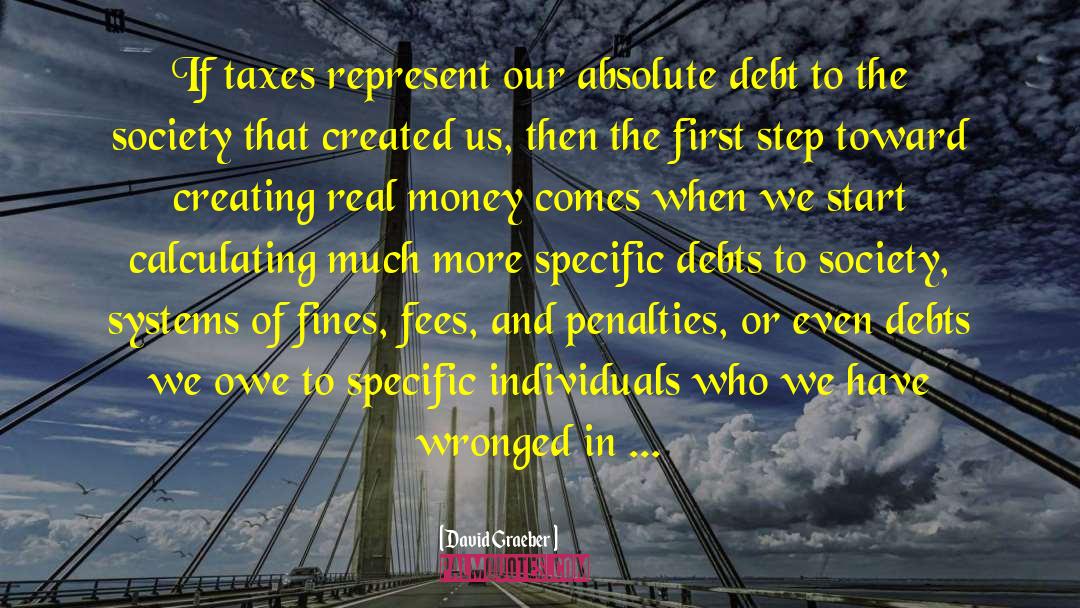
The most famous of these is the Law of Jubilee: a law that stipulated that all debts would be automatically cancelled "in the Sabbath year" (that is, after seven years had passed), and that all who languished in bondage owing to such debts would be released.

About the only thing we can imagine
is catastrophe.

Still, the ground was only really prepared for capitalism in the familiar sense of the term when the merchants began to organize themselves into eternal bodies as a way to win monopolies, legal or de facto, and avoid the ordinary risks of trade.
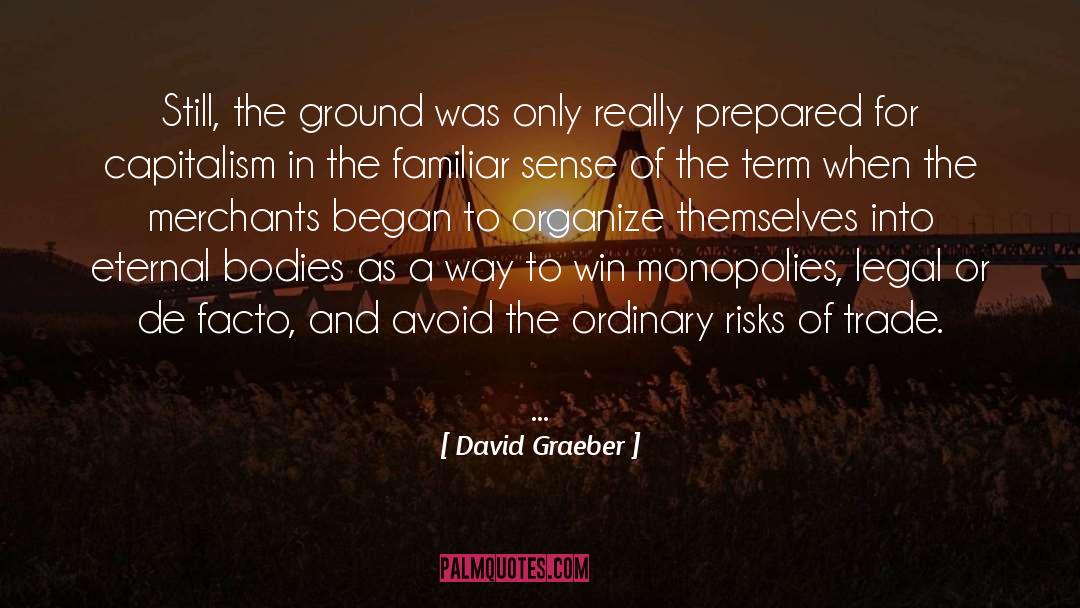
But ultimately, sovereign power really is, still, the right to brush such legalities aside, or to make them up as one goes along.164 The United States might call itself "a country of laws, not men," but as we have learned in recent years, American presidents can order torture, assassinations, domestic surveillance programs, even set up extra-legal zones like Guantanamo where they can treat prisoners pretty much any way they choose to. Even on the lowest levels, those who enforce the law are not really subject to it. It's extraordinary difficult, for instance, for a police officer to do anything to an American citizen that would lead to that officer being convicted of a crime.165
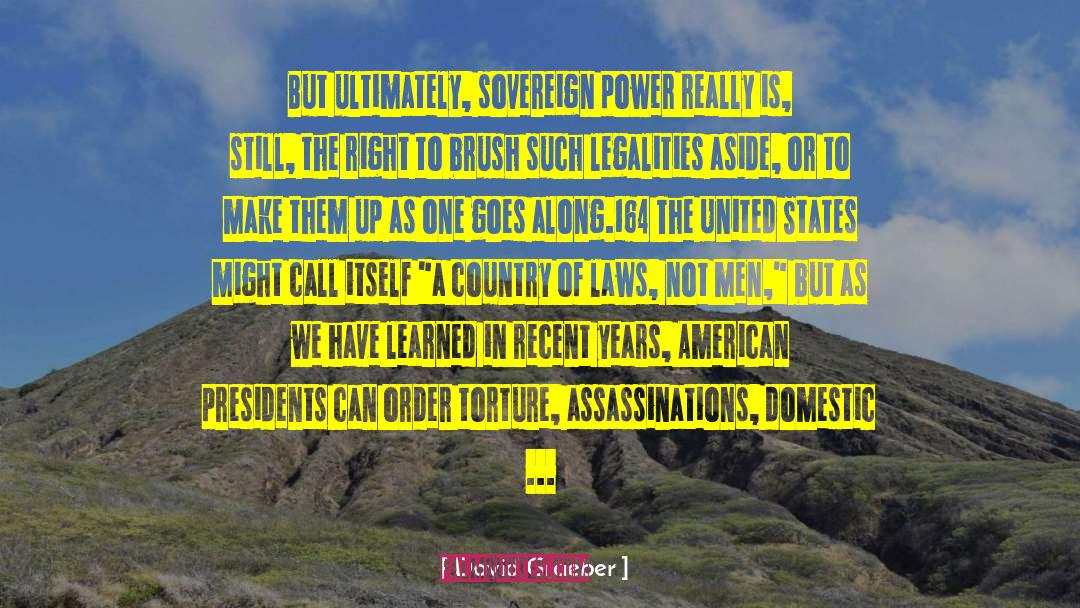
The ultimate, hidden truth of the world is that it is something that we make, and could just as easily make differently.

Instead, the situation has sparked an efflorescence of social media (Facebook, Youtube, Instagram, Twitter): basically, of forms of electronic media that lend themselves to being produced and consumed while pretending to do something else. I am convinced this is the primary reason for the rise of social media...
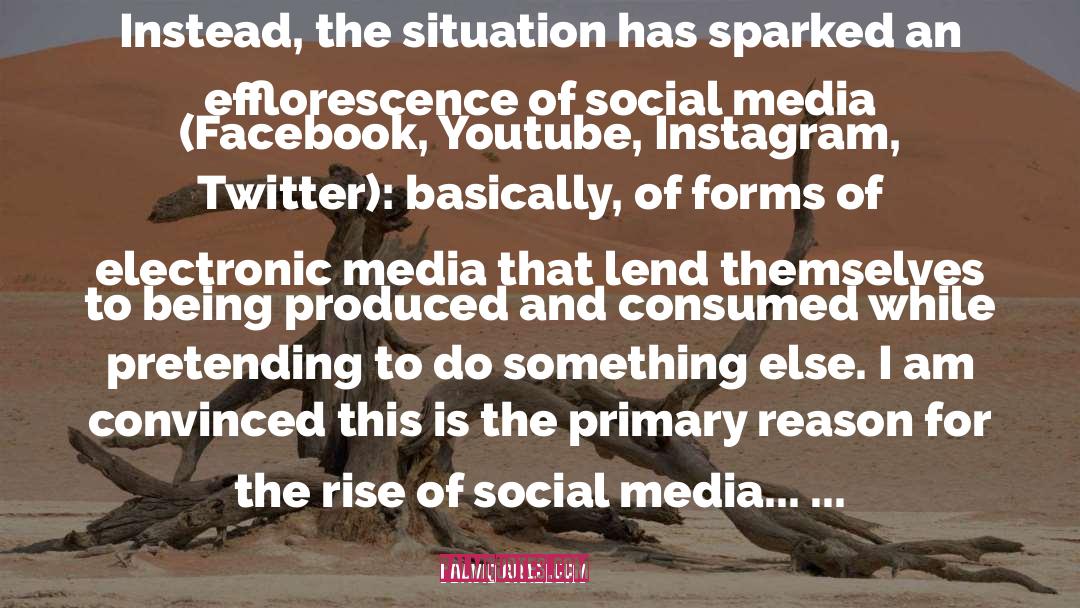
For all its celebration of markets and individual initiative, this alliance of government and finance often produces results that bear a striking resemblance to the worst excesses of bureaucratization in the former Soviet Union or former colonial backwaters of the Global South. There is a rich anthropological literature, for instance, on the cult of certificates, licenses, and diplomas in the former colonial world. Often the argument is that in countries like Bangladesh, Trinidad, or Cameroon, which hover between the stifling legacy of colonial domination and their own magical traditions, official credentials are seen as a kind of material fetish - magical objects conveying power in their own right, entirely apart from the real knowledge, experience, or training they're supposed to represent. But since the eighties, the real explosion of credentialism has been in what are supposedly the most "advanced" economies, like the United States, Great Britain, or Canada.

Freedom has to be in tension with something, or it's just randomness.
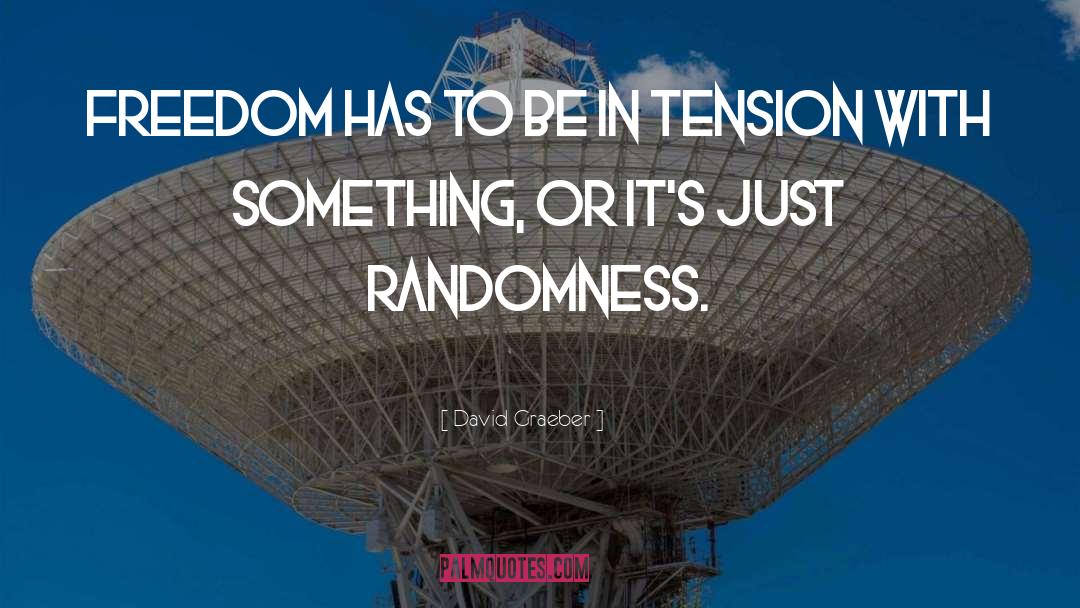
The notion that a society could be regulated entirely by market forces is a utopian fantasy: an impossible dream generated by imagining what the world would be like if everyone's behavior was utterly consistent with some abstract moral ideal-in this case, economic theories that assume all human action is based on calculating, systematic, (but scrupulously law-abiding), greed.
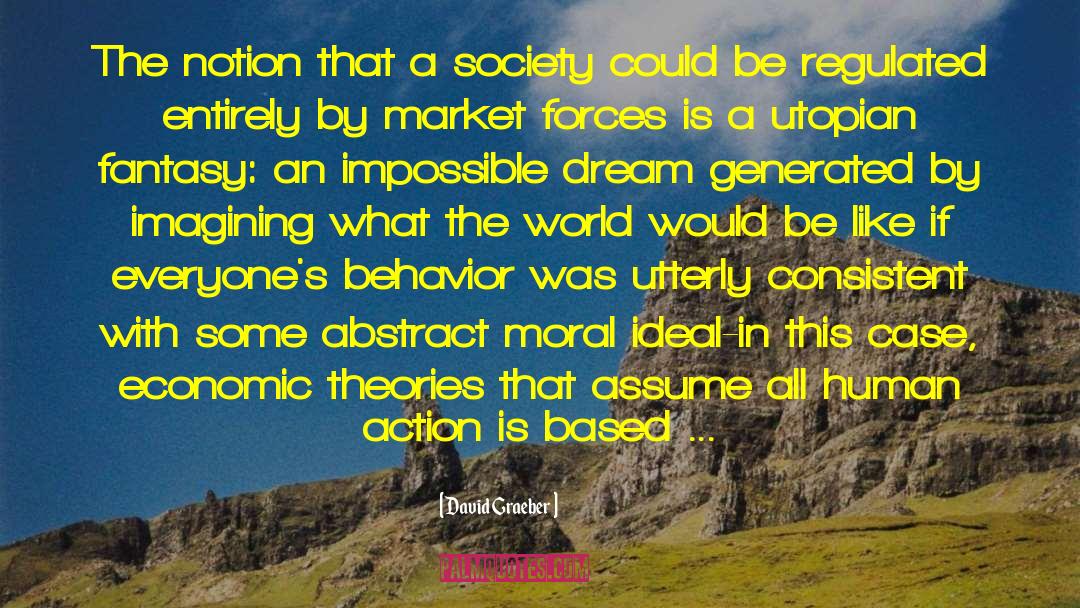
Competition forces factory owners to mechanize production, so as to reduce labor costs, but while this is to the short-term advantage of the individual firm, the overall effect of such mechanization is actually to drive the overall rate of profit of all firms down.
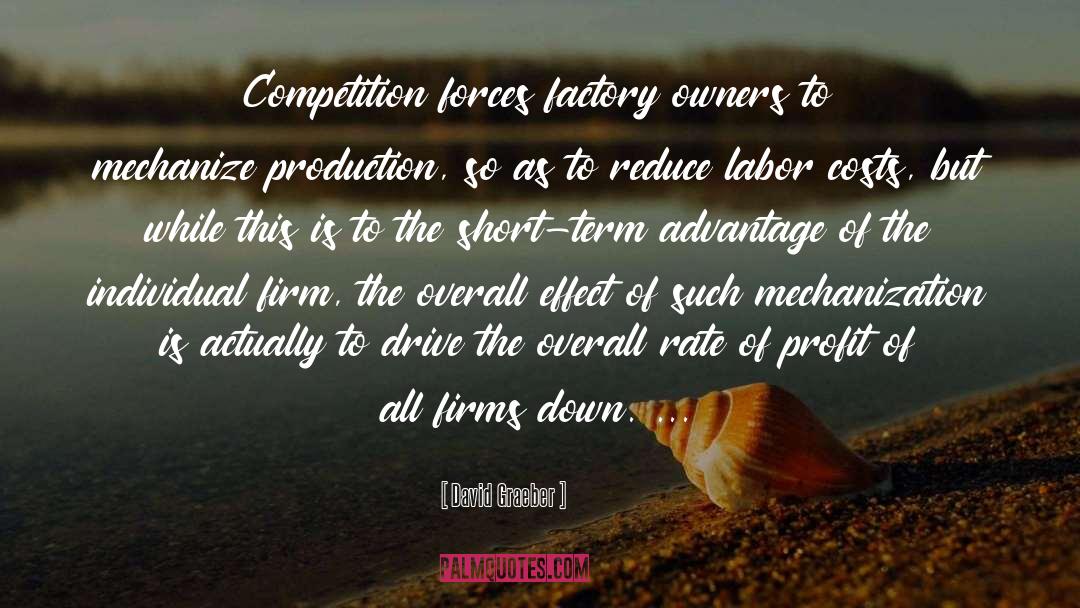
[Superheroes] aren't fascists. They are just ordinary, decent, super-powerful people who inhabit a world in which fascism is the only political possibility.
![David Graeber Quotes: [Superheroes] aren't fascists. They are David Graeber Quotes: [Superheroes] aren't fascists. They are](https://palmquotes.com/author/david-graeber-quotes-874966.jpg)
Meanwhile, the U.S. debt remains, as it has been since 1790, a war debt; the United States continues to spend more on its military than do all other nations on earth put together, and military expenditures are not only the basis of the government's industrial policy; they also take up such a huge proportion of the budget that by many estimations, were it not for them, the United States would not run a deficit at all.
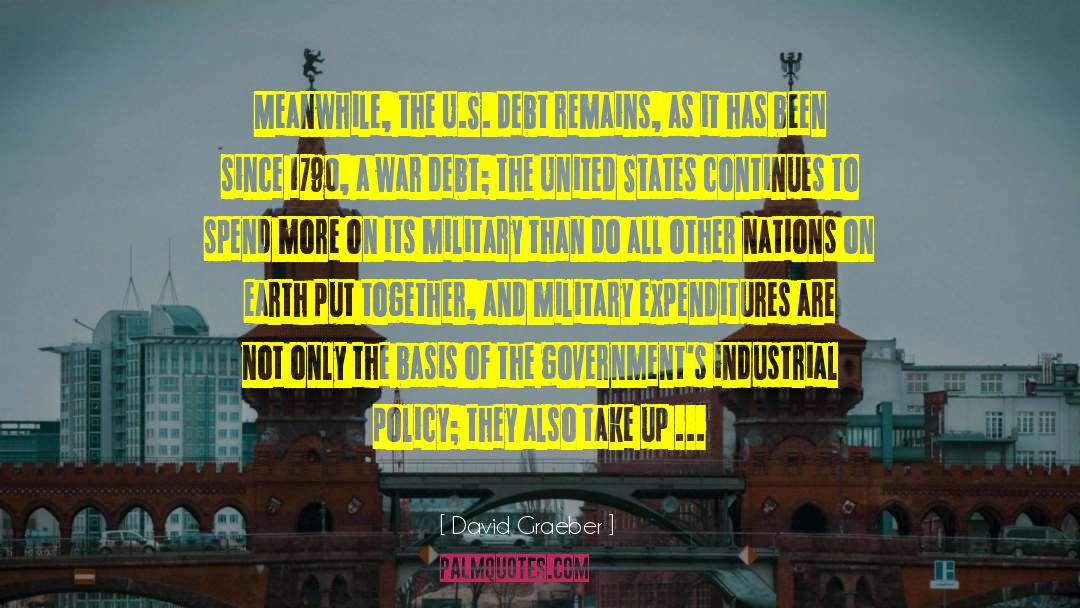
A slightly different version of the argument
this is really the core of Max Weber's reflections on the subject
is that a bureaucracy, once created, will immediately move to make itself indispensable to anyone trying to wield power, no matter what they wish to do with it. The chief way to do this is always by attempting to monopolize access to certain key types of information.
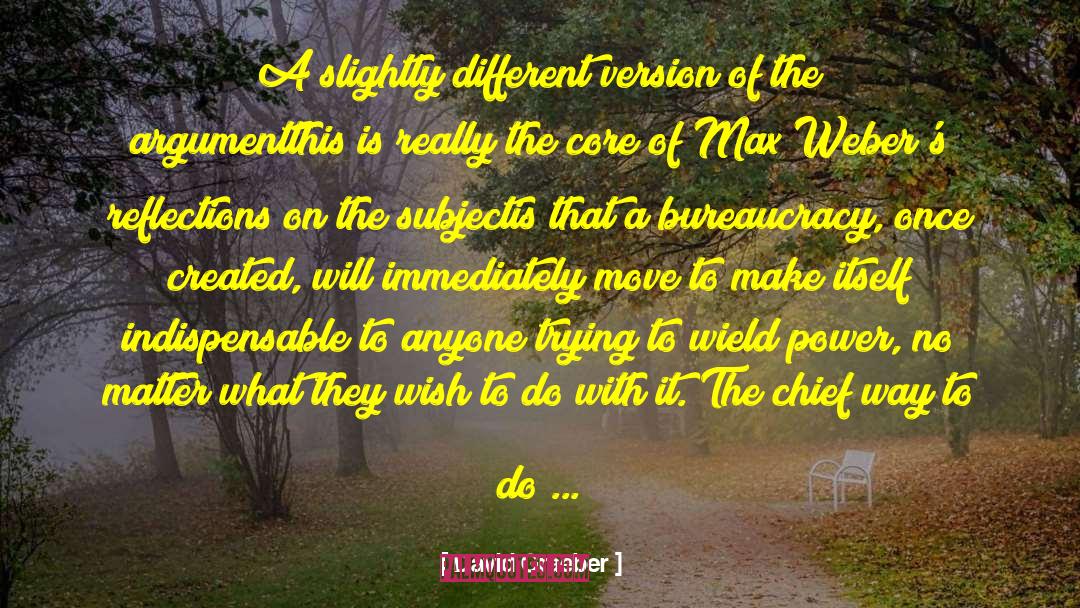
... one must oneself, in relations with one's friends and allies, embody the society one wishes to create.

There is a whole school of thought that holds bureaucracy tends to expand according to a kind of perverse but inescapable inner logic. The argument runs as follows: if you create a bureaucratic structure to deal with some problem, that structure will invariably end up creating other problems that seem as if they, too, can only be solved by bureaucratic means. In universities, this is sometimes informally referred to as the "creating committees to deal with the problem of too many committees" problem.
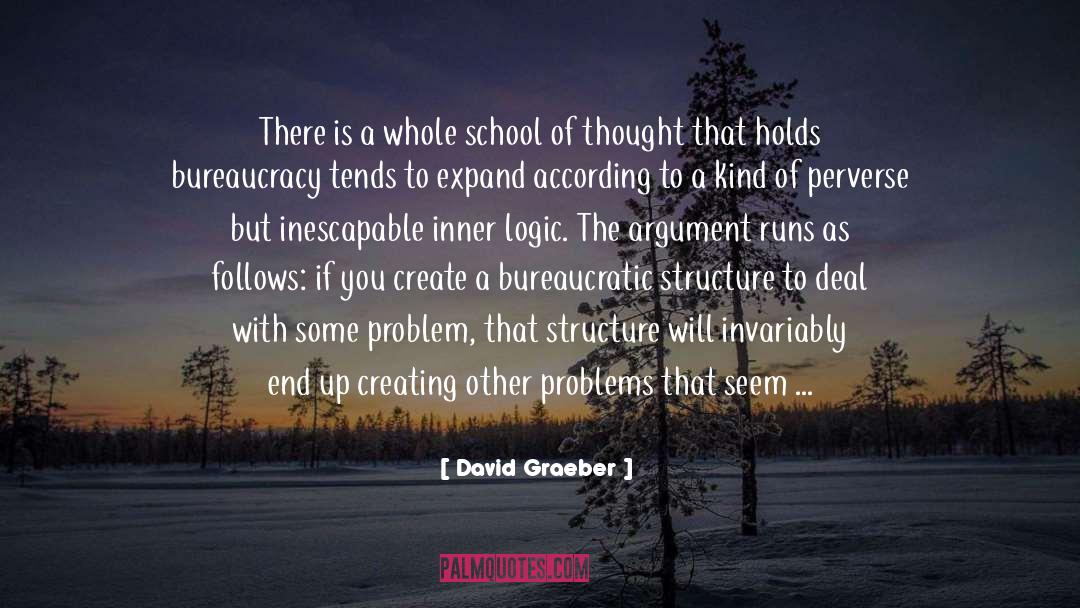
Banks are institutions to which the government has granted the power to create money - or,

We have become a plague upon ourselves and upon the Earth. It is cosmically unlikely that the developed world will choose to end its orgy of fossil energy consumption, and the Third World its suicidal consumption of landscape. Until such time as Homo Sapiens should decide to rejoin nature, some of us can only hope for the right virus to come along.
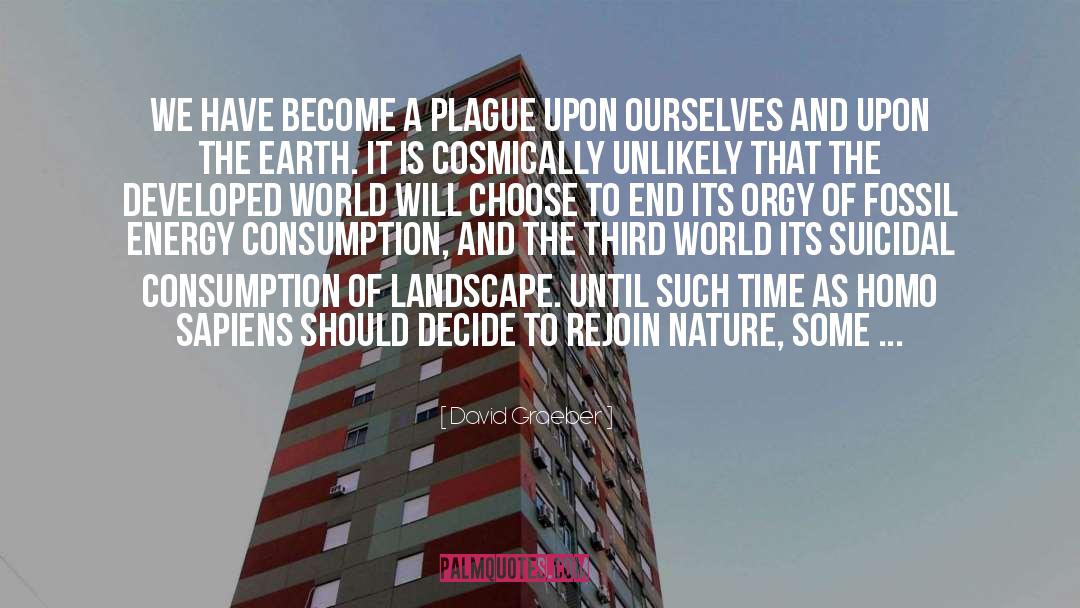
Markets aren't real. They are mathematical models, created by imagining a self-contained world where everyone has exactly the same motivation and the same knowledge and is engaged in the same self-interested calculating exchange. Economists are aware that reality is always more complicated; but they are also aware that to come up with a mathematical model, one always has to make the world into a bit of a cartoon.
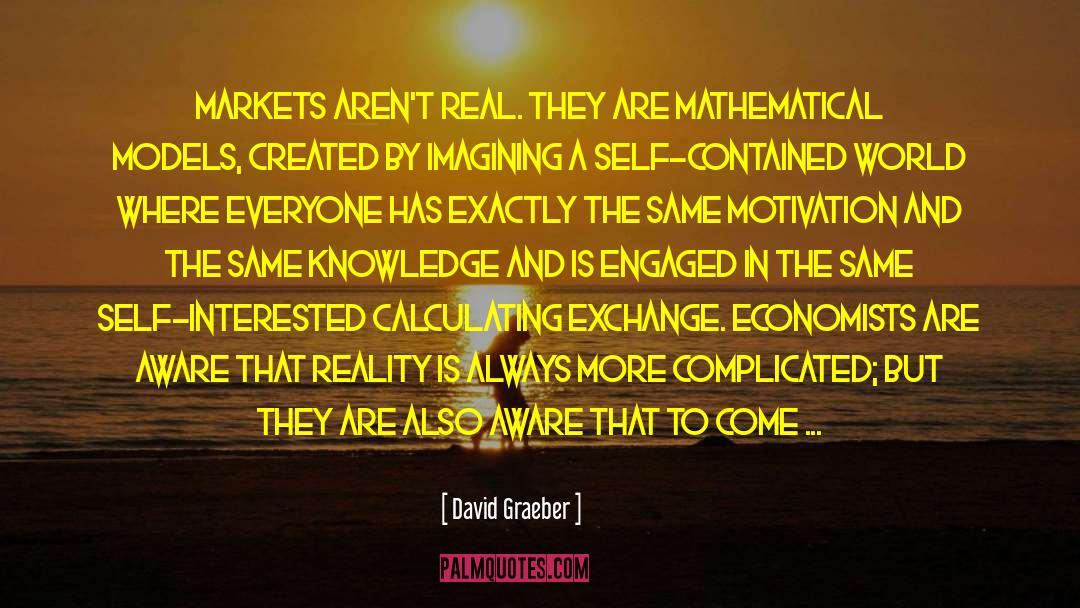
If the existence of bullshit jobs seems to defy the logic of capitalism, one possible reason for their proliferation might be that the existing system isn't capitalism...In many ways, it resembles classic medieval feudalism, displaying the same tendency to create endless hierarchies of lords, vassals, and retainers.
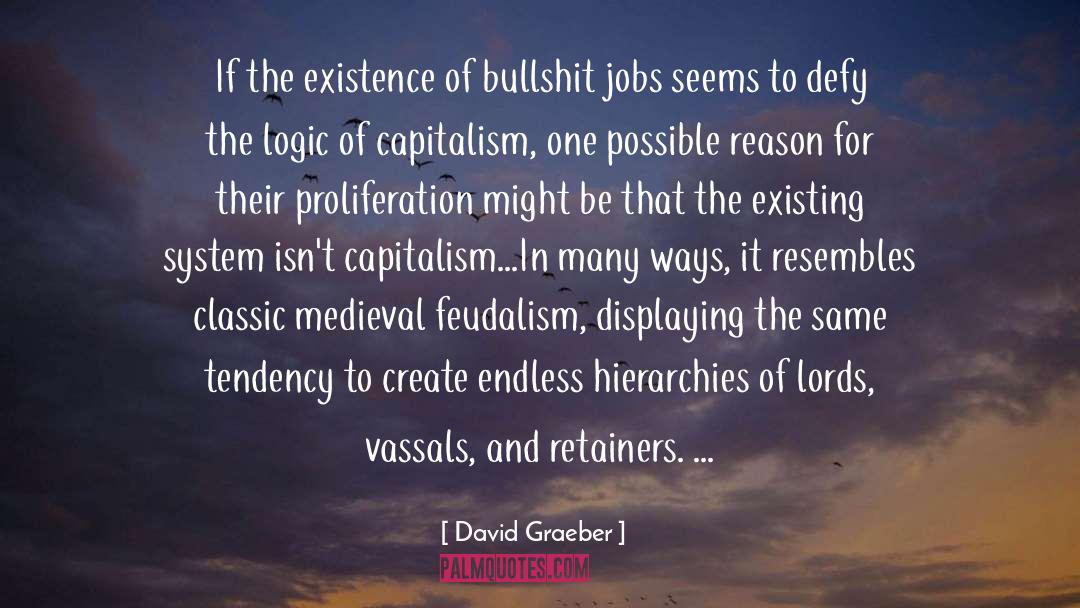
For at least a century, anthropologists have largely played the role of gadflies: whenever some ambitious European or American theorist appears to make some grandiose generalizations about how human beings go about organizing political, economic, or family life, it's always the anthropologist who shows up to point out that there are people in Samoa or Tierra del Fuego or Burundi who do things exactly the other way around.
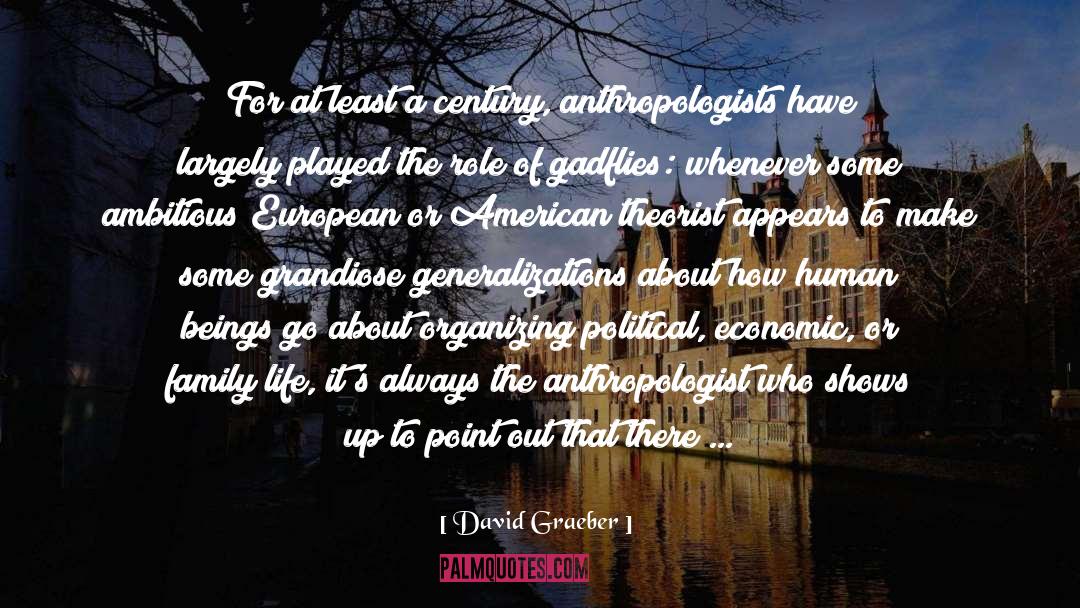
It's true that most American citizens think of themselves as living in a democratic country. But when was the last time that any Americans actually sat down and came to a collective decision? Maybe if they are ordering pizzas, but basically never.
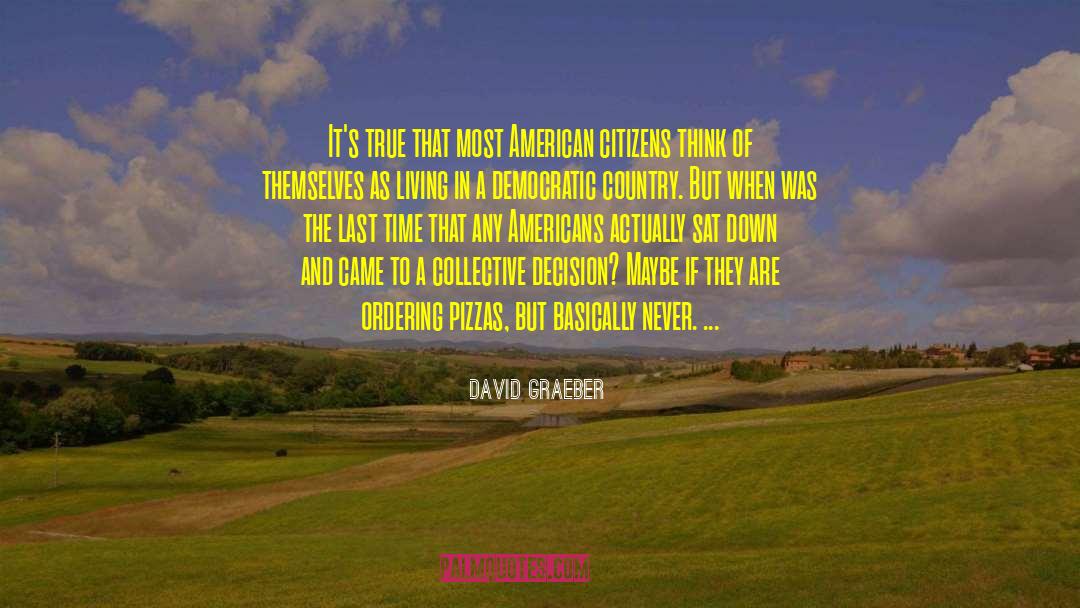
What is debt anyway? A debt is just the perversion of a promise. It is a promise corrupted by both math and violence.

So what are people actually referring to when they talk about "deregulation"? In ordinary usage, the word seems to mean "changing the regulatory structure in a way that I like.

As Pierre Bourdieu was later to point out in describing a similar economy of trust in contemporary Algeria: it's quite possible to turn honor into money, almost impossible to convert money into honor.

What is the difference between a gangster pulling out a gun and demanding you give him a thousand dollars of "protection money," and that same gangster pulling out a gun and demanding you provide him with a thousand-dollar "loan"? In
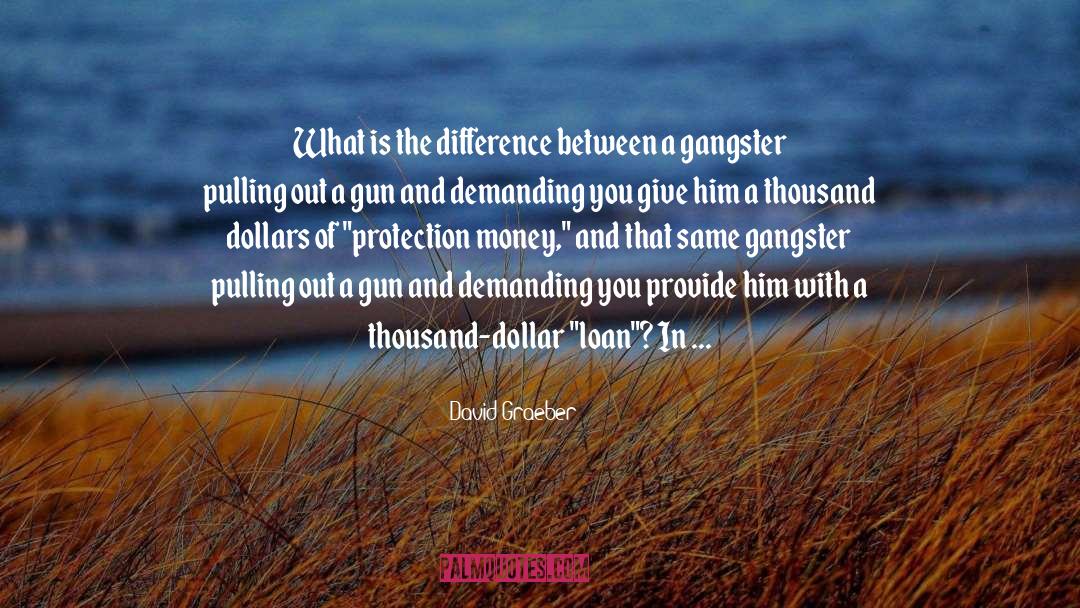
The more we allow aspects of our everyday existence to fall under the purview of bureaucratic regulations, the more everyone concerned colludes to downplay the fact (perfectly obvious to those actually running the system) that all of it ultimately depends on the threat of physical harm.
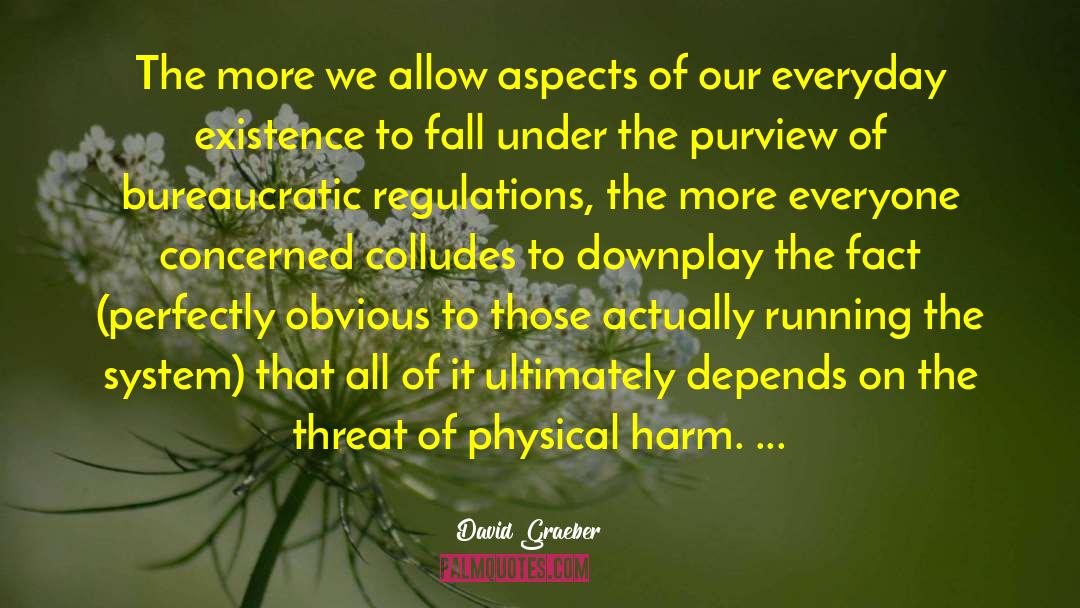
Insofar as Americans have a popular image of postal workers, it has become increasingly squalid. But this didn't just happen. It is the result of intentional policy choices. Since the 1980s, legislators have led the way in systematically defunding the post office and encouraging private alternatives as part of an ongoing campaign to convince Americans that government doesn't really work.
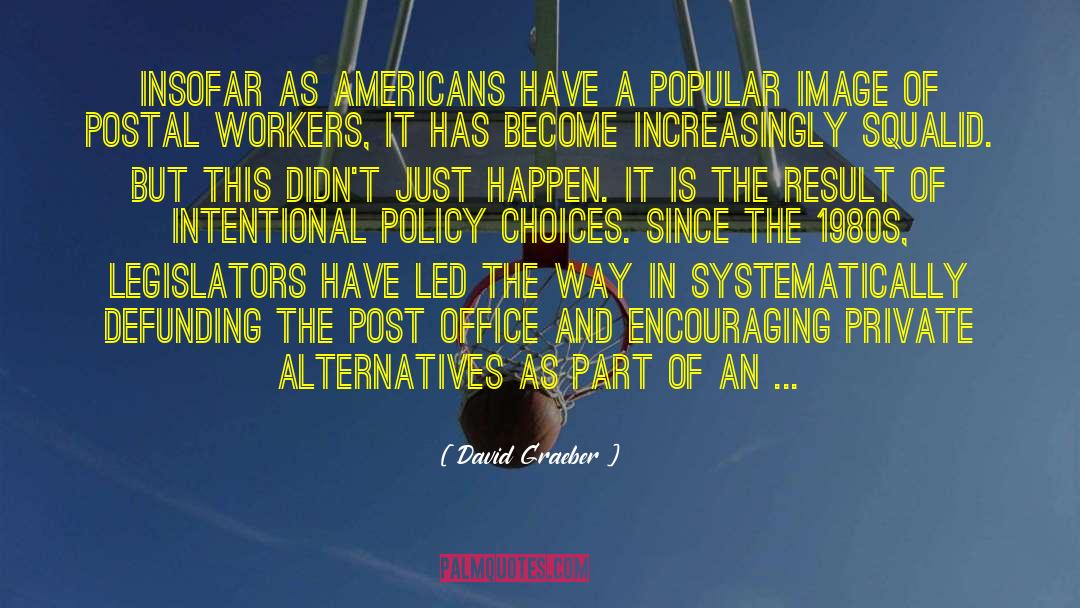
Just as the invention of new forms of industrial automation in the eighteenth and nineteenth centuries had the paradoxical effect of turning more and more of the world's population into full-time industrial workers, so has all the software designed to save us from administrative responsibilities in recent decades ultimately turned us all into part or full-time administrators.
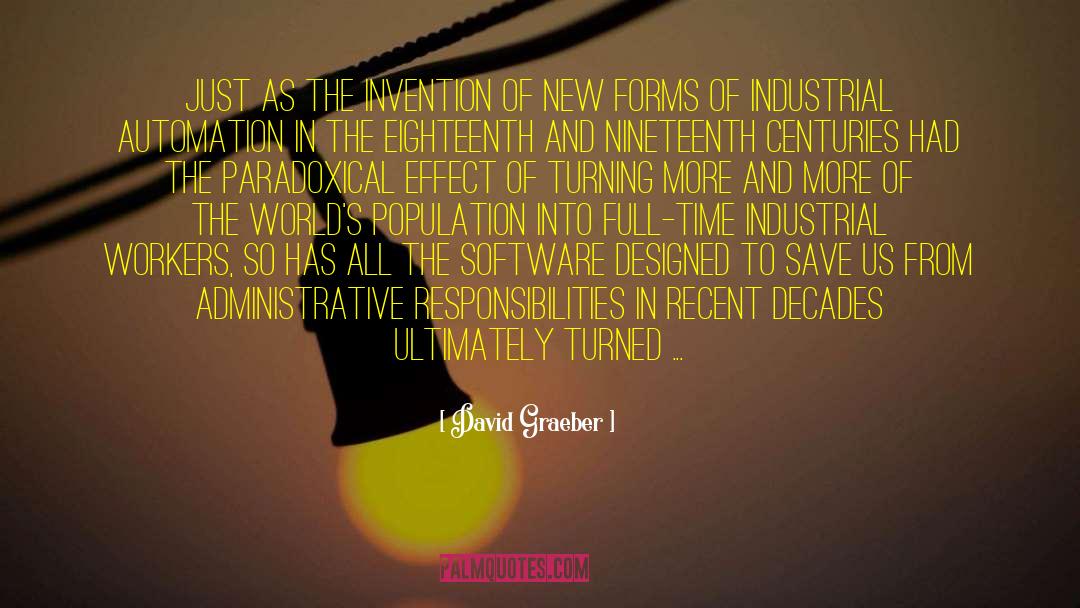
So: Police are bureaucrats with weapons. If you think about it, this is a really ingenious trick. Because when most of think about police, we do not think of them as enforcing regulation. We think of them as fighting crime, and when we think of "crime," the kind of crime we have in our minds in violent crime. Even though, in fact, what police mostly do is exactly the opposite: they bring the threat of force to bear on situations that would otherwise have nothing to do with it.
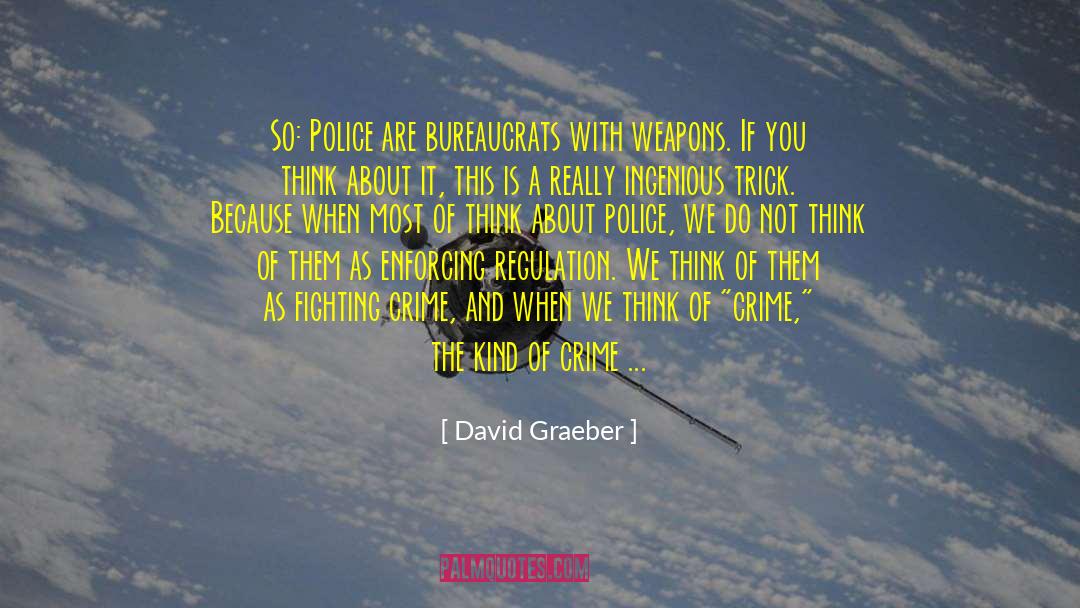
One of the most effective ways for a system of authority to tout its virtues is not to speak of them directly, but to create a particularly vivid image of their absolute negation - of what it claims life would be like in the total absence of, say, patriarchal authority, or capitalism, or the state.

Looking over world literature, it is almost impossible to find a single sympathetic representation of a moneylender- or anyway, a professional moneylender, which means by definition one who charges interest. I'm not sure there is another profession (executioners?) with such a consistently bad image. It's especially remarkable when one considers that unlike executioners, usurers often rank among the richest and most powerful people in their communities. Yet the very name, "usurer," evokes images of loan sharks, blood money, pounds of flesh, the selling of souls, and behind them all, the Devil, often represented as himself a kind of usurer, an evil accountant with his books and ledgers.

Capitalism, he noted, is not something imposed on us by some outside force. It only exists because every day we wake up and continue to produce it. If we woke up one morning and all collectively decided to produce something else, then we wouldn't have capitalism anymore.
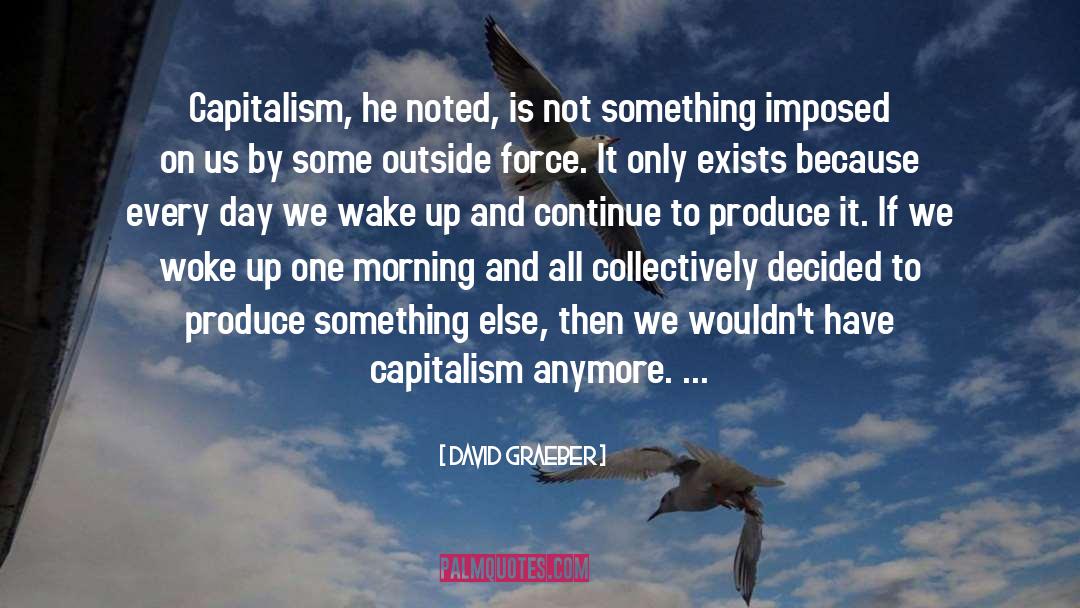
The "public" does not work - a sentence like "most of the American public works in the service industry" would never appear in a magazine or paper, and if a journalist were to attempt to write such a sentence, her editor would certainly change it to something else. It is especially odd since the public does apparently have to go to work:

End of work arguments became increasingly popular in the late seventies and early eighties, as radical thinkers pondered what would happen to traditional working-class struggle once there was no longer a working class. (The answer: it would turn into identity politics.)
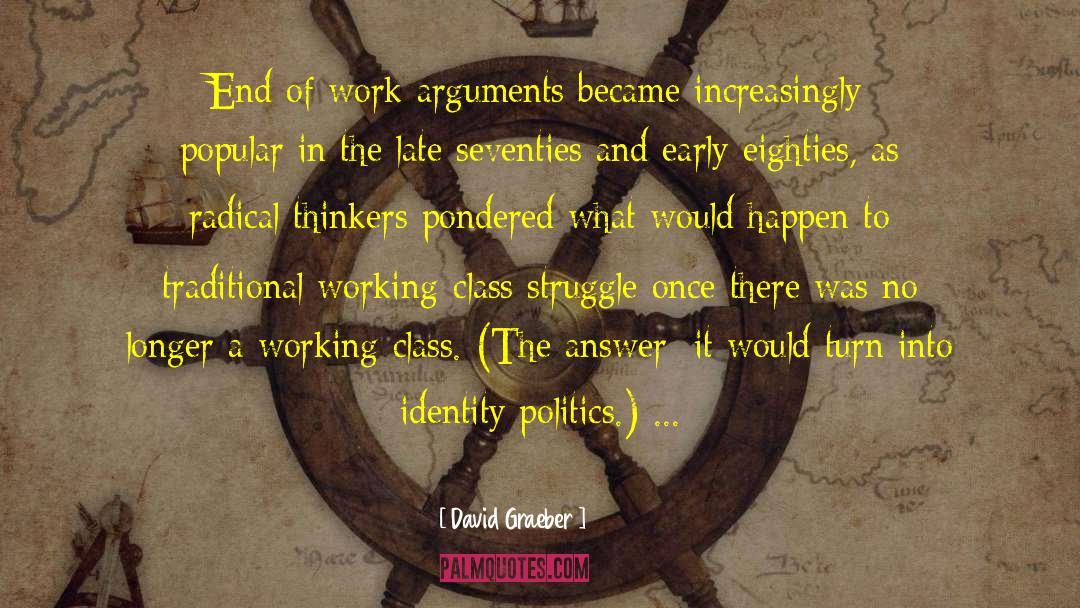
Then you ask: what, within this cosmos, is the opposite of a vampire? The answer is obvious. The opposite of a vampire is a werewolf.

Political economy tends to see work in capitalist societies as divided between two spheres: wage labor, for which the paradigm is always factories, and domestic labor – housework, childcare – relegated mainly to women. The first is seen primarily as a matter of creating and maintaining physical objects. The second is probably best seen as a matter of creating and maintaining people and social relations.
[...] This makes it easier to see the two as fundamentally different sorts of activity, making it hard for us to recognize interpretive labor, for example, or most of what we usually think of as women's work, as labor at all. To my mind it would probably be better to recognize it as the primary form of labor. Insofar as a clear distinction can be made here, it's the care, energy, and labor directed at human beings that should be considered fundamental. The things we care most about – our loves, passions, rivalries, obsessions – are always other people; and in most societies that are not capitalist, it's taken for granted that the manufacture of material goods is a subordinate moment in a larger process of fashioning people. In fact, I would argue that one of the most alienating aspects of capitalism is the fact that it forces us to pretend that it is the other way around, and that societies exist primarily to increase their output of things.
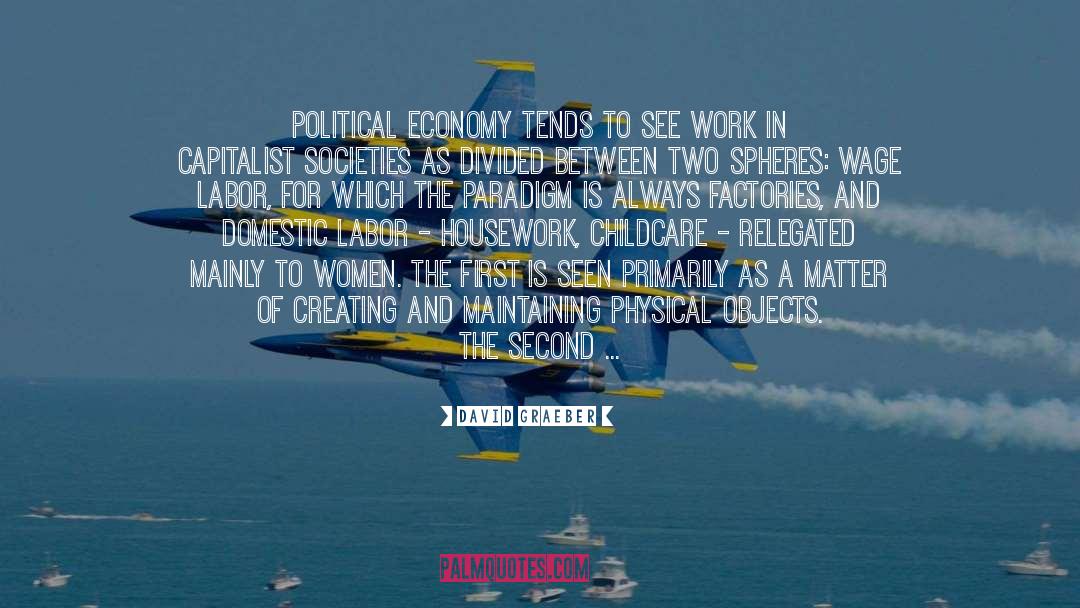
What we are witnessing is the rise of those forms of popular culture that office workers can produce and consume during the scattered, furtive shards of time they have at their disposal in workplaces where even when there's nothing for them to do, they still can't admit it openly.
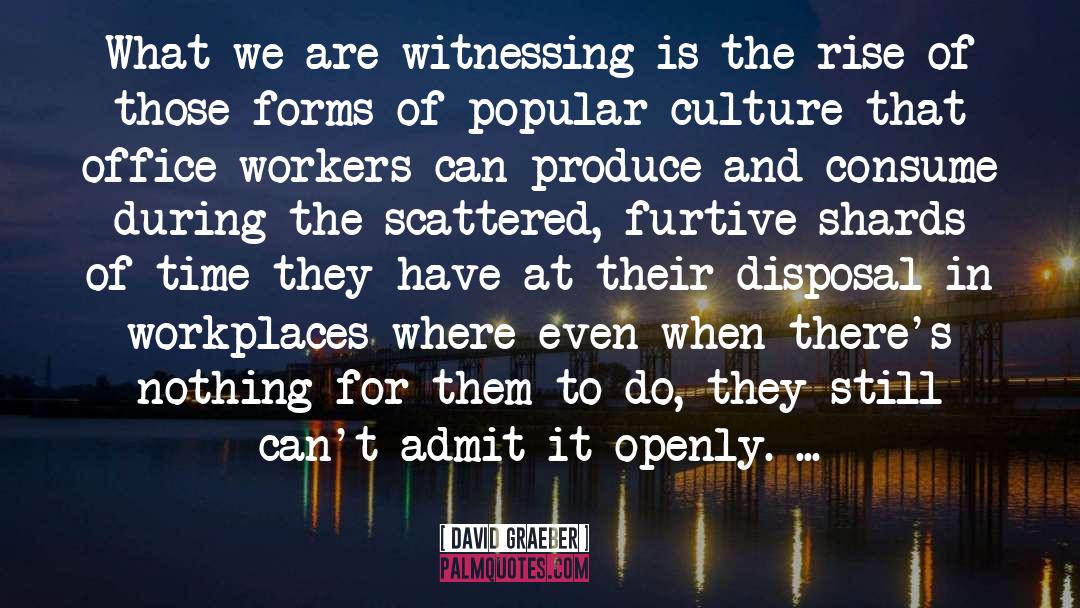
After all, we do owe everything we are to others. This is simply true. The language we speak and even think in, our habits and opinions, the kind of food we like to eat, the knowledge that makes our lights switch on and toilets flush, even the style in which we carry out our gestures of defiance and rebellion against social conventions - all of this we learned from other people, most of them long dead.

I am well known by my friends to be a workaholic - to their often justifiable annoyance. I am therefore keenly aware that such behavior is at best slightly pathological, and certainly in no sense makes one a better person.

What it mainly revealed was that one of the most insidious of the "hidden injuries of class" in North American society was the denial of the right to do good, to be noble, to pursue any form of value other than money – or, at least, to do it and to gain any financial security or rewards for having done. The passionate hatred of the "liberal elite" among right-wing populists came down, in practice, to the utterly justified resentment towards a class that had sequestered, for its own children, every opportunity to pursue love, truth, beauty, honor, decency, and to be afforded the means to exist while doing so. The endless identification with soldiers ("support our troops!) – that is, with individuals who have, over the years, been reduced to little more than high tech mercenaries enforcing of a global regime of financial capital – lay in the fact that these are almost the only individuals of working class origin in the US who have figured out a way to get paid for pursuing some kind of higher ideal, or at least being able to imagine that's what they're doing. Obviously most would prefer to pursue higher ideals in way that did not involve the risk of having their legs blown off. The sense of rage, in fact, stems above all from the knowledge that all such jobs are taken by children of the rich.

For every subtle and complicated question, there is a perfectly simple and straightforward answer, which is wrong. -

Threatening others with physical harm allows the possibility of cutting through all this. It makes possible relations of a far more simple and schematic kind ("cross this line and I will shoot you," "one more word out of any of you and you're going to jail"). This is of course why violence is so often the preferred weapon of the stupid.

If you have the power to hit people over the head whenever you want, you don't have to trouble yourself too much figuring out what they think is going on, and therefore, generally speaking, you don't. Hence the sure-fire way to simplify social arrangements, to ignore the incredibly complex play of perspectives, passions, insights, desires, and mutual understandings that human life is really made of, is to make a rule and threaten to attack anyone who breaks it. This is why violence has always been the favored recourse of the stupid: it is the one form of stupidity to which it is almost impossible to come up with an intelligent response. It is also of course the basis of the state.
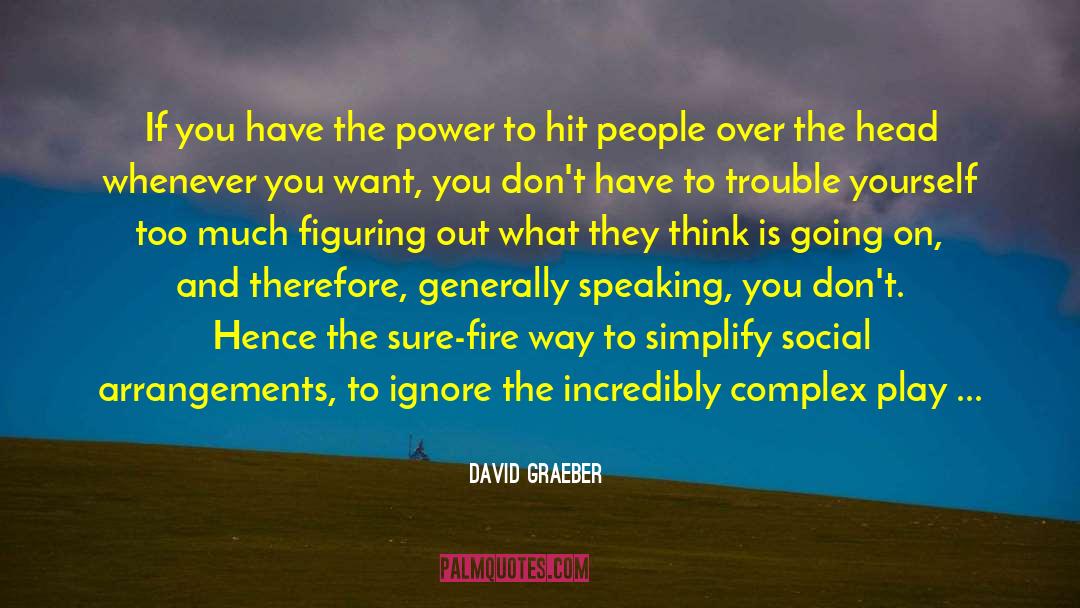
Power makes you lazy. Insofar as our earlier theoretical discussion of structural violence revealed anything, it was this: that while those in situations of power and privilege often feel it as a terrible burden of responsibility, in most ways, most of the time, power is all about what you don't have to worry about, don't have to know about, and don't have to do.
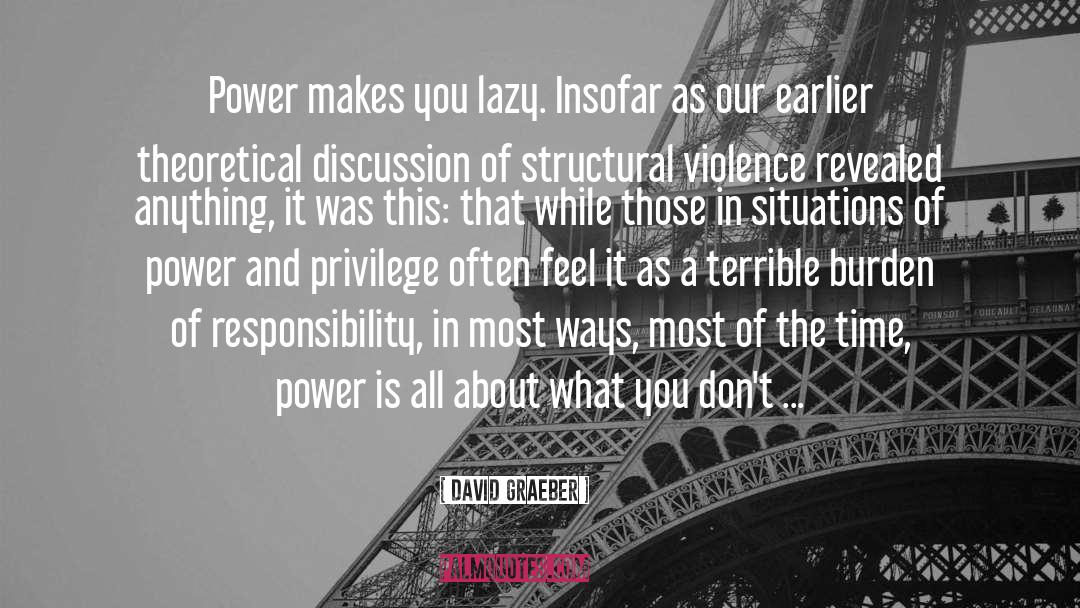
Freuchen tells how one day, after coming home hungry from an unsuccessful walrus-hunting expedition, he found one of the successful hunters dropping off several hundred pounds of meat. He thanked him profusely. The man objected indignantly:
"Up in our country we are human!" said the hunter. "And since we are human we help each other. We don't like to hear anybody say thanks for that. What I get today you may get tomorrow. Up here we say that by gifts one makes slaves and by whips one makes dogs.
... The refusal to calculate credits and debits can be found throughout the anthropological literature on egalitarian hunting societies. Rather than seeing himself as human because he could make economic calculations, the hunter insisted that being truly human meant refusing to make such calculations, refusing to measure or remember who had given what to whom, for the precise reason that doing so would inevitably create a world where we began "comparing power with power, measuring, calculating" and reducing each other to slaves or dogs through debt. It's not that he, like untold millions of similar egalitarian spirits throughout history, was unaware that humans have a propensity to calculate. If he wasn't aware of it, he could not have said what he did. Of course we have a propensity to calculate. We have all sorts of propensities. In any real-life situation, we have propensities that drive us in several different contradictory directions simultaneously. No one is more real

Since at least the Great Depression, we've been hearing warnings that automation was or was about to be throwing millions out of work - Keynes at the time coined the term "technological unemployment," and many assumed the mass unemployment of the 1930s was just a sign of things to come - and while this might make it seem such claims have always been somewhat alarmist, what this book suggests is that the opposite was the case. They were entirely accurate. Automation did, in fact, lead to mass unemployment. We have simply stopped the gap by adding dummy jobs that are effectively made up. A combination of political pressure from both right and left, a deeply held popular feeling that paid employment alone can make one a full moral person, and finally, a fear on the part of the upper classes, already noted by George Orwell in 1933, of what the laboring masses might get up to if they had too much leisure on their hands, has ensured that whatever the underlying reality, when it comes to official unemployment figures in wealthy countries, the needle should never jump too far from the range of 3 to 8 percent. But if one eliminates bullshit jobs from the picture, and the real jobs that only exist to support them, one could say that the catastrophe predicted in the 1930s really did happen. Upward of 50 percent to 60 percent of the population has, in fact, been thrown out of work.
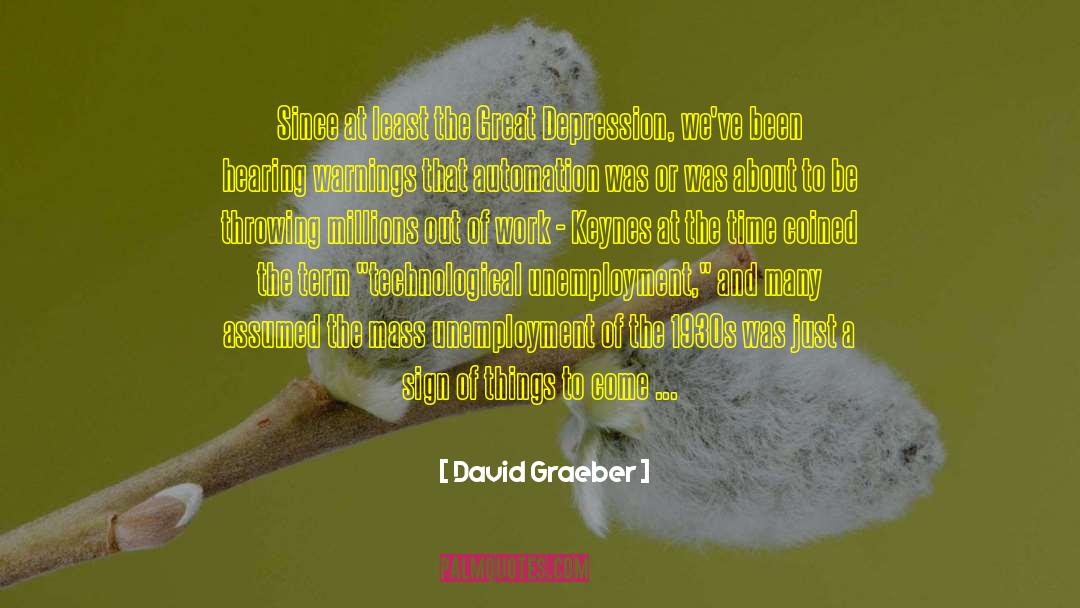
They quickly started passing from hand to hand and operated something like currency. The government first tried to forbid their use, then a year or two later - and this became a familiar pattern in China - when it realized that it could not suppress them, switched gears and established a bureau empowered to issue such notes themselves.
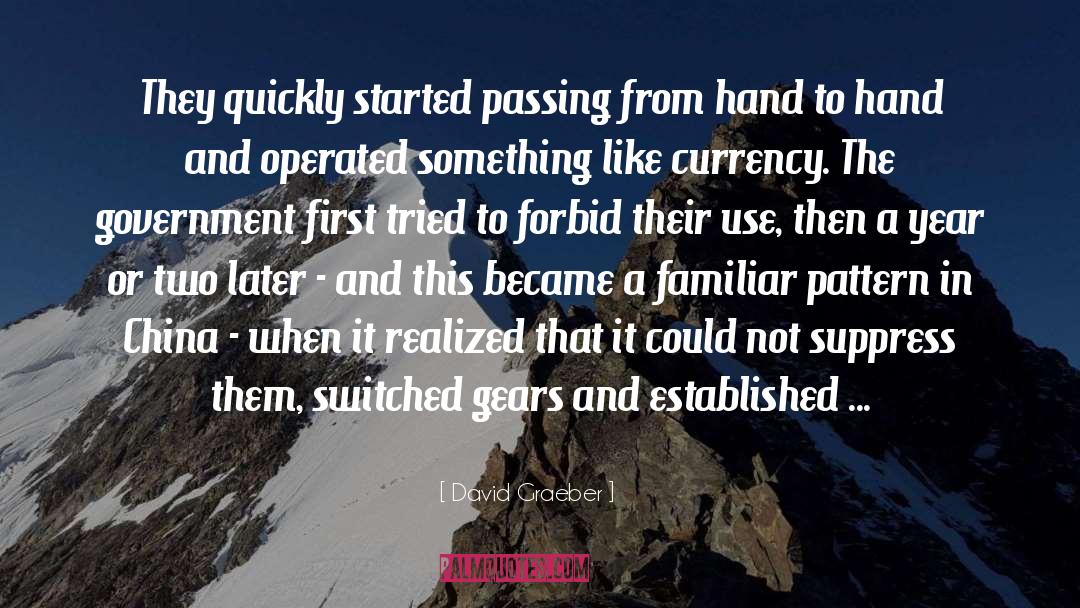
Revolutionary constituencies always involve a tacit alliance between the least alienated and the most oppressed.
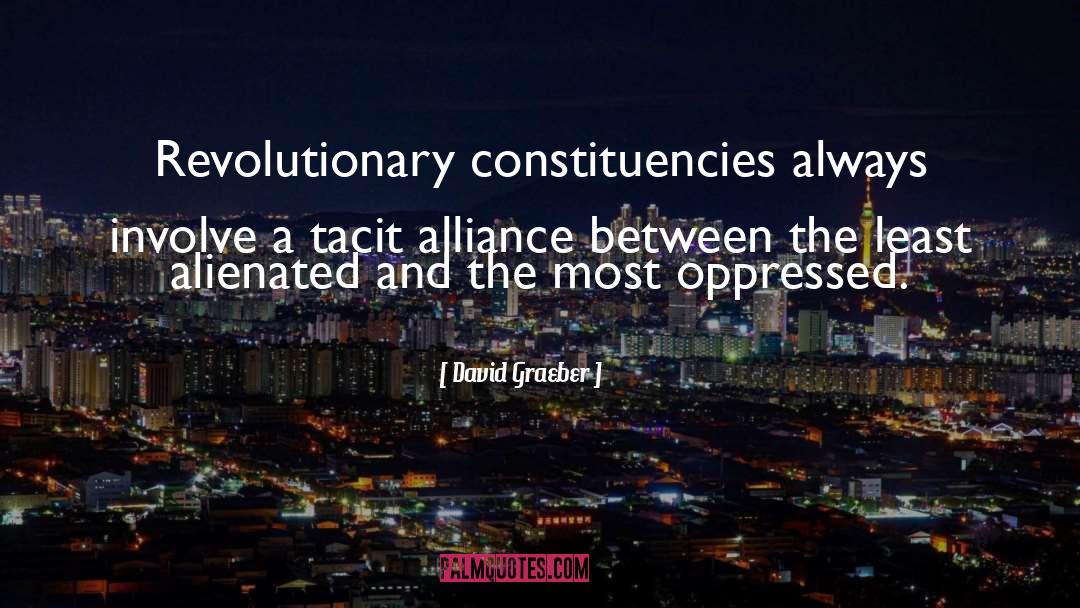
One day when Nasruddin was left in charge of the local teahouse, the king and some retainers, who had been hunting nearby, stopped in for breakfast. "Do you have quail eggs?" asked the king. "I'm sure I can find some," answered Nasruddin. The king ordered an omelet of a dozen quail eggs, and Nasruddin hurried out to look for them. After the king and his party had eaten, he charged them a hundred gold pieces. The king was puzzled. "Are quail eggs really that rare in this part of the country?" "It's not so much quail eggs that are rare around here," Nasruddin replied. "It's more visits from kings.

The "self-actualization" philosophy from which most of this new bureaucratic language emerged insists that we live in a timeless present, that history means nothing, that we simply create the world around us through the power of the will.
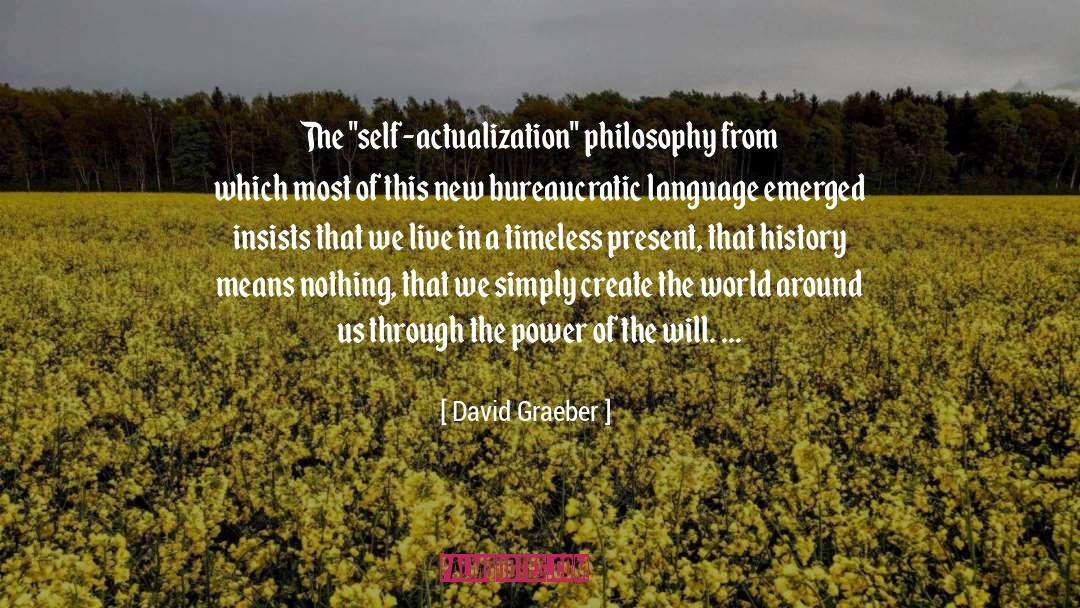
A revolution on a world scale will take a very long time. But it is also possible to recognize that it is already starting to happen. The easiest way to get our minds around it is to stop thinking about revolution as a thing - "the" revolution, the great cataclysmic break - and instead ask "what is revolutionary action?" We could then
suggest: revolutionary action is any collective action which rejects, and therefore confronts, some form of power or domination and in doing so, reconstitutes social relations - even within the collectivity - in that light. Revolutionary action does not necessarily have to aim to topple governments. Attempts to create autonomous communities in the face of power (using Castoriadis' definition
here: ones that constitute themselves, collectively make their own rules or principles of operation, and continually reexamine them), would, for
instance, be almost by definition revolutionary acts. And history shows us that the continual accumulation
of such acts can change (almost) everything.
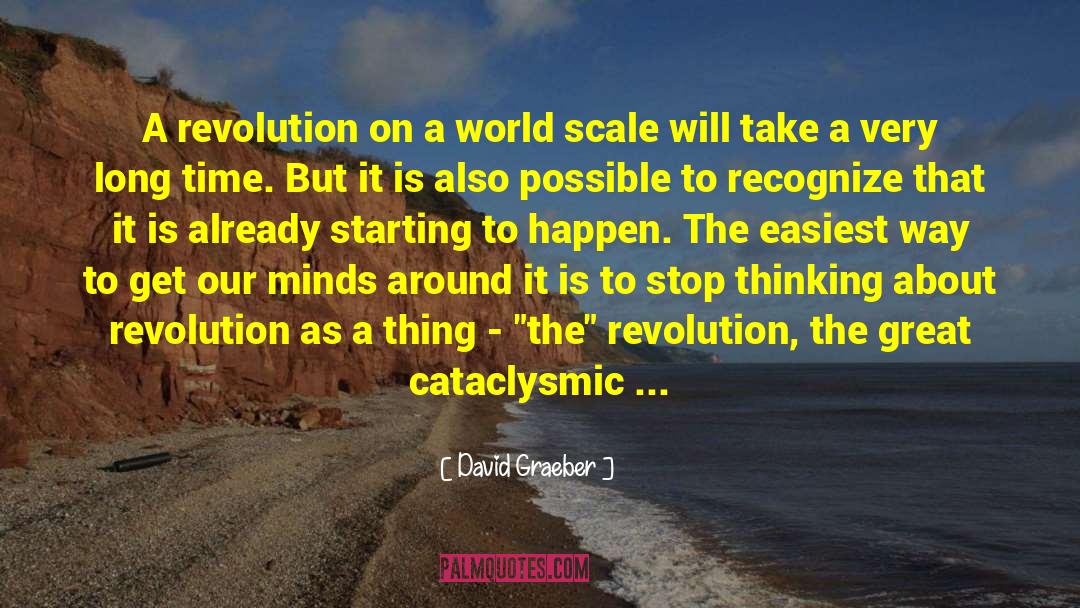
ON AUGUST 15, 1971, United States President Richard Nixon announced that foreign-held U.S. dollars would no longer be convertible into gold - thus stripping away the last vestige of the international gold standard.1 This was the end of a policy that had been effective since 1931, and confirmed by the Bretton Woods accords at the end of World War II: that while United States citizens might no longer be allowed to cash in their dollars for gold, all U.S. currency held outside the country was to be redeemable at the rate of $35 an ounce. By doing so, Nixon initiated the regime of free-floating currencies that continues to this day.

Bureaucracies, I've suggested, are not themselves forms of stupidity so much as they are ways of organizing stupidity
of managing relationships that are already characterized by extremely unequal structures of imagination, which exist because of the existence of structural violence.
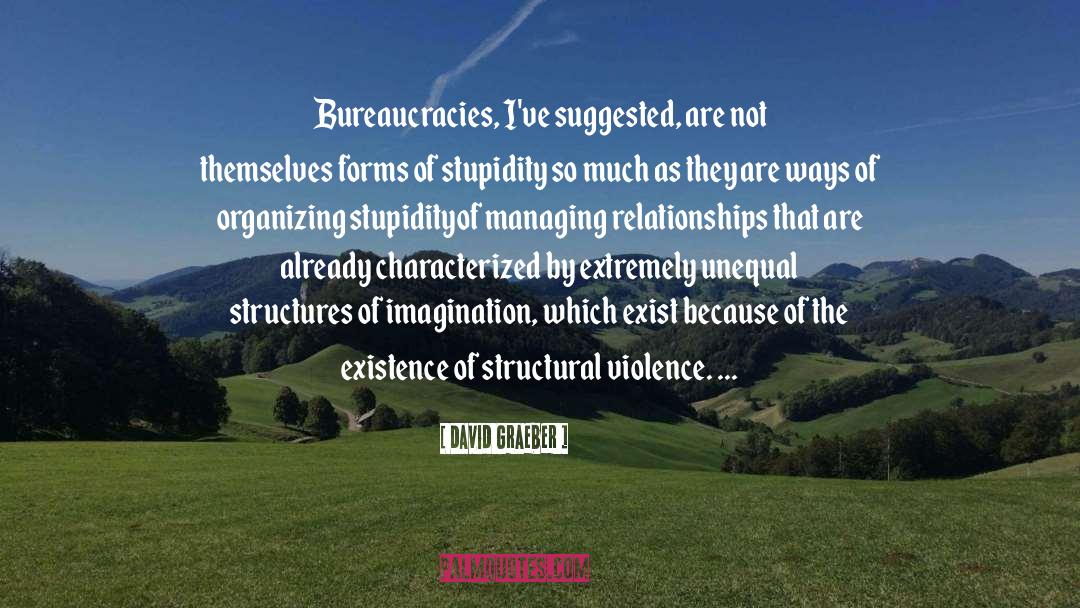
About the only policies that can't be referred to as "deregulation" are ones that aim to reverse some other policy that has already been labeled "deregulation," which means it's important, in playing the game, to have your policy labeled "deregulation" first.

The reasons why anthropologists haven't been able to come up with a simple, compelling story for the origins of money is because there's no reason to believe there could be one. Money was no more ever "invented" than music or mathematics or jewelry. What we call "money" isn't a "thing" at all; it's a way of comparing things mathematically, as proportions: of saying one of X is equivalent to six of Y. As such it is probably as old as human thought.
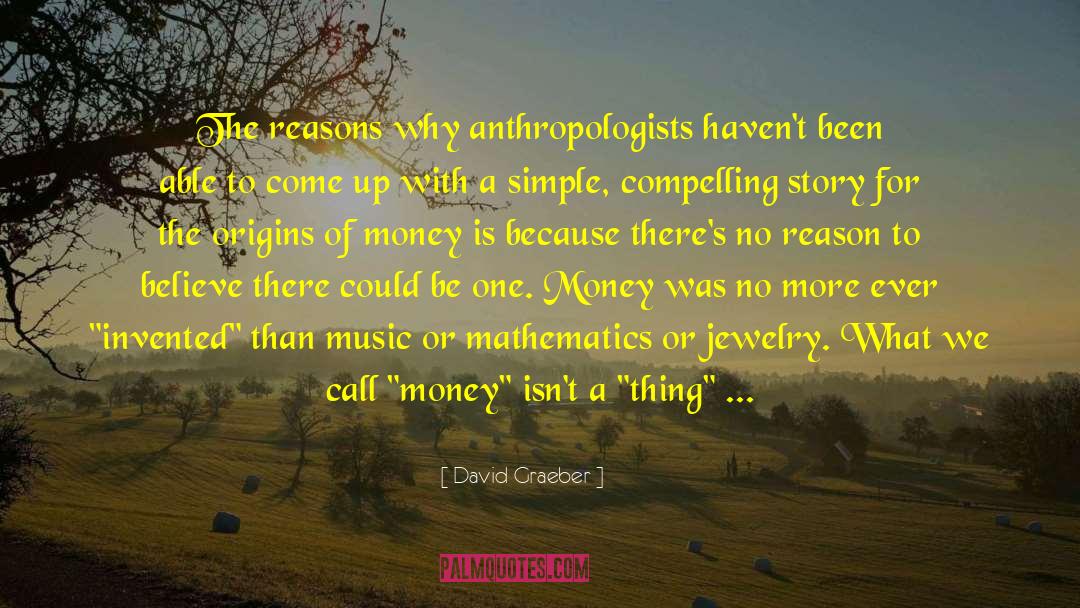
In some of the more lawless parts of the former Soviet Union, gangs prey so systematically on travelers on trains and buses that they have developed the habit of giving each victim a little token to confirm that the bearer has already been robbed. Obviously, one step toward the creation of a state. Actually,

How did we get here? My own suspicion is that we are looking at the final effects of the militarization of American capitalism itself. In fact, it could well be said that the last thirty years have seen the construction of a vast bureaucratic apparatus for the creation and maintenance of hopelessness, a giant machine designed, first and foremost, to destroy any sense of possible alternative futures. At its root is a veritable obsession on the part of the rulers of the world - in response to the upheavals of the 1960s and 1970s - with ensuring that social movements cannot be seen to grow, flourish, or propose alternatives; that those who challenge existing power arrangements can never, under any circumstances, be perceived to win.
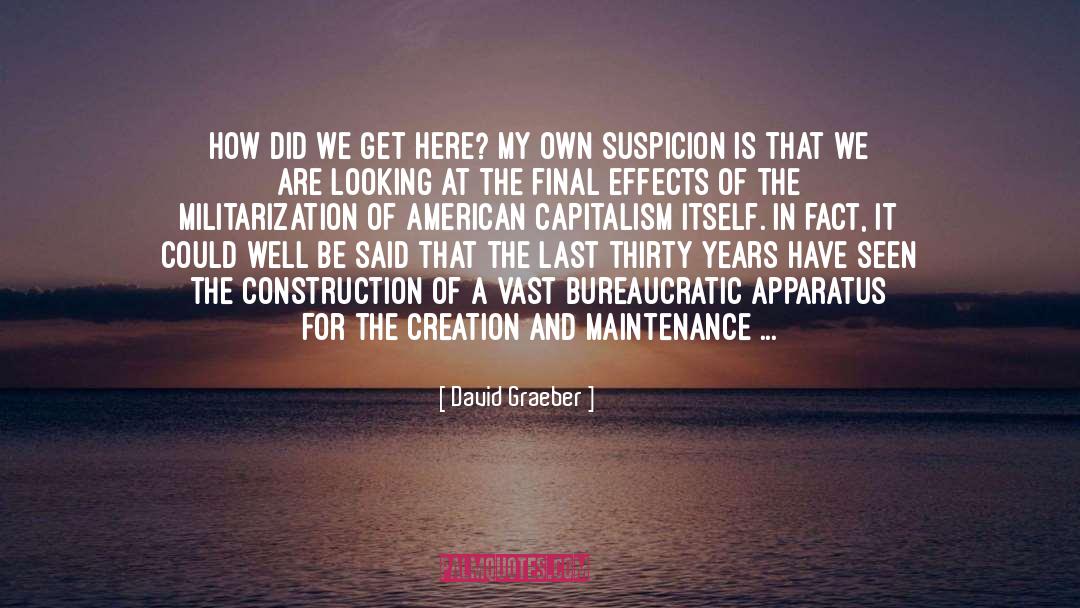
Take one famous example: arguments about property destruction after Seattle. Most of these, I think, were really arguments about capitalism. Those who decried window-breaking did so mainly because they wished to appeal to middle-class consumers to move towards global exchange-style green consumerism, and to ally with labor bureaucracies and social democrats abroad. This was not a path designed to provoke a direct confrontation with capitalism, and most of those who urged us to take this route were at least skeptical about the possibility that capitalism could ever really be defeated. Many were in fact in favor of capitalism, if in a significantly humanized form. Those who did break windows, on the other hand, didn't care if they offended suburban homeowners, because they did not figure that suburban homeowners were likely to ever become a significant element in any future revolutionary anticapitalist coalition. They were trying, in effect, to hijack the media to send a message that the system was vulnerable -- hoping to inspire similar insurrectionary acts on the part of those who might be considering entering a genuinely revolutionary alliance; alienated teenagers, oppressed people of color, undocumented workers, rank-and-file laborers impatient with union bureaucrats, the homeless, the unemployed, the criminalized, the radically discontent. If a militant anticapitalist movement was to begin, in America, it would have to start with people like these: people who don't need to
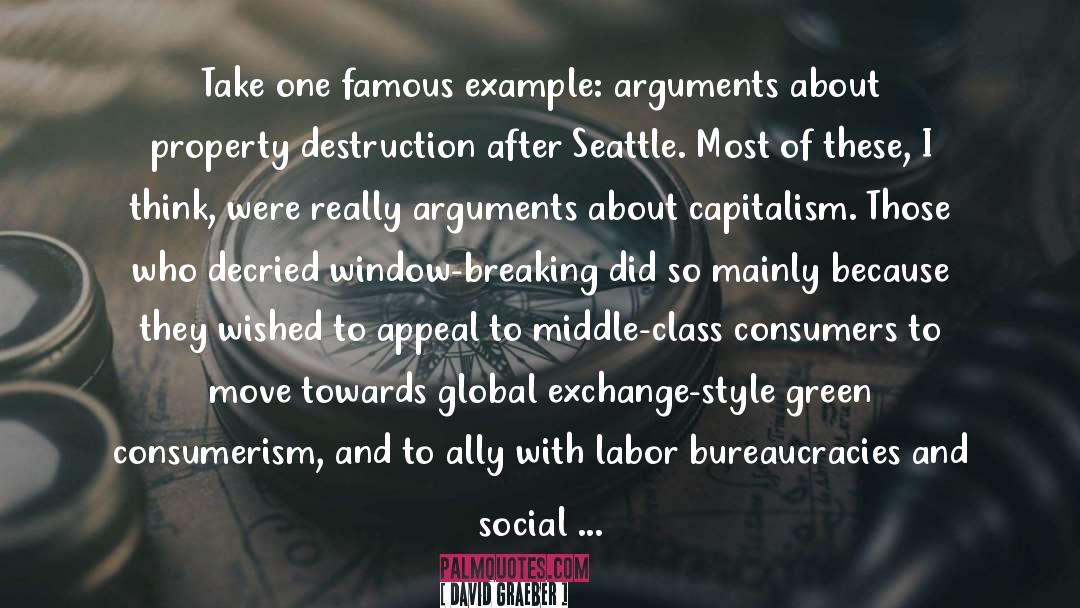
Women everywhere are always expected to continually imagine what one situation or another would look like from a male point of view. Men are almost never expected to do the same for women. So deeply internalized is this pattern of behavior that many men react to any suggestion that they might do otherwise as if it were itself an act of violence.
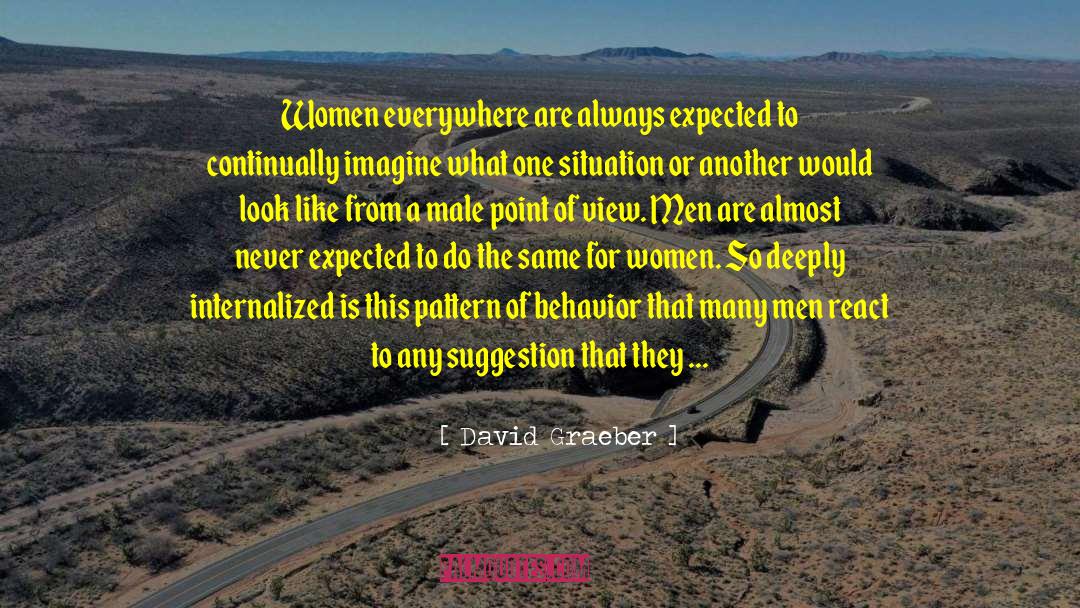
It is a strange, repetitive feature of action movies that the infuriating go-by-the-rules boss of the maverick hero is almost invariably Black.)

Shit jobs tend to be blue collar and pay by the hour, whereas bullshit jobs tend to be white collar and salaried. Those who work shit jobs tend to be the object of indignities; they not only work hard but also are held in low esteem for that very reason. But at least they know they're doing something useful. Those who work bullshit jobs are often surrounded by honor and prestige; they are respected as professionals, well paid, and treated as high achievers - as the sort of people who can be justly proud of what they do. Yet secretly they are aware that they have achieved nothing; they feel they have done nothing to earn the consumer toys with which they fill their lives; they feel it's all based on a lie - as, indeed, it is.
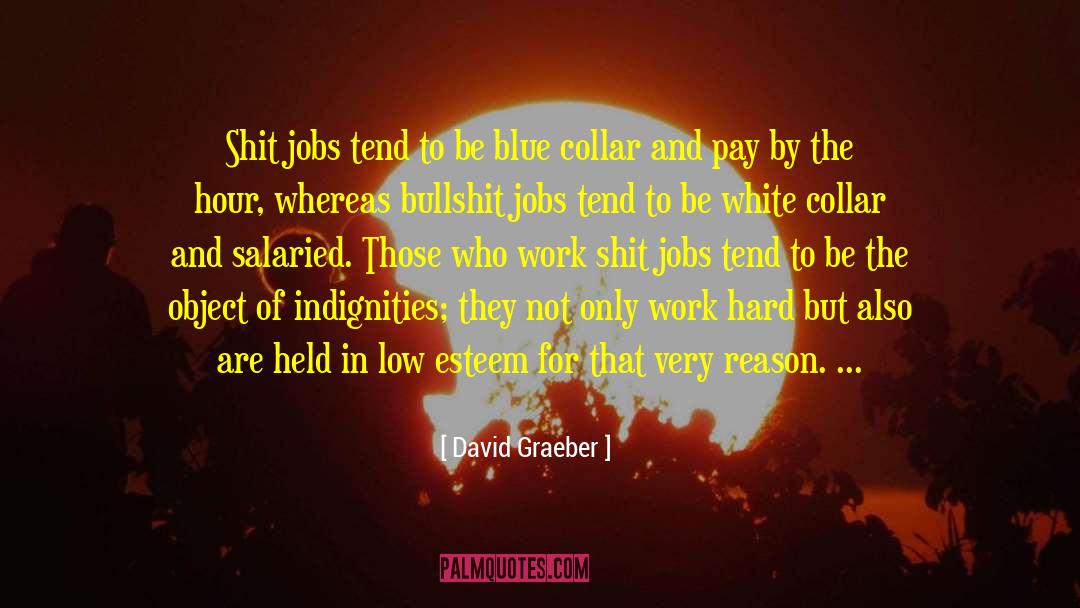
There seems a general rule that, the more obviously one's work benefits other people, the less one is likely to be paid for it.
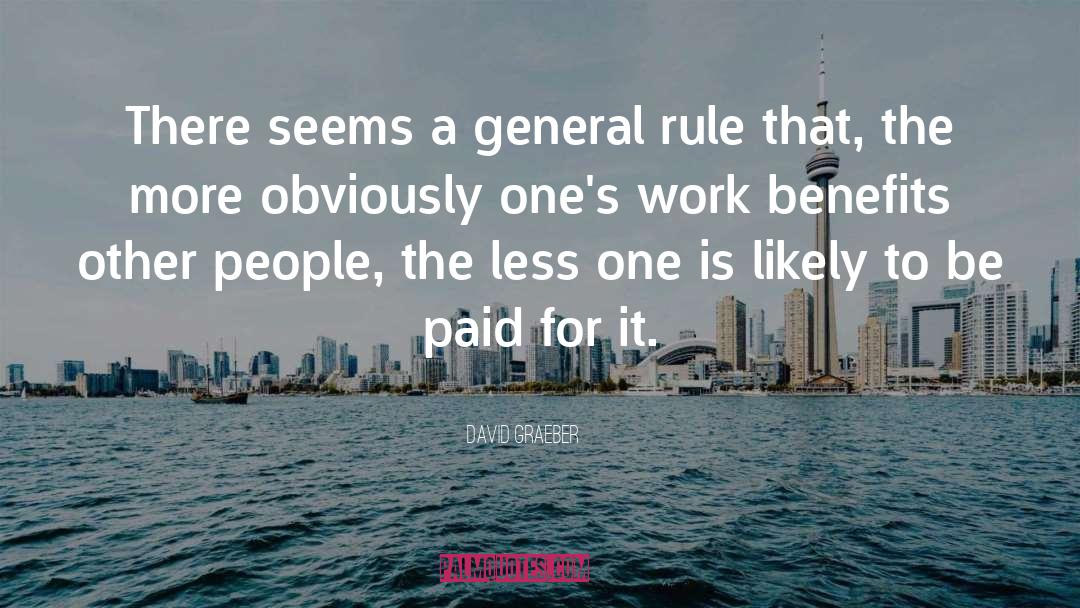
As a result, amongst working-class Americans, government is now generally seen as being made up of two sorts of people: "politicians," who are blustering crooks and liars but can at least occasionally be voted out of office, and "bureaucrats," who are condescending elitists almost impossible to uproot.

Arguments about debt have been going on for at least five thousand years. For most of human history - at least, the history of states and empires - most human beings have been told that they are debtors.4 Historians, and particularly historians of ideas, have been oddly reluctant to consider the human consequences, especially since this situation - more than any other - has caused continual outrage and resentment. Tell people they are inferior, they are unlikely to be pleased, but this surprisingly rarely leads to armed revolt. Tell people that they are potential equals who have failed and that therefore, even what they do have they do not deserve, that it isn't rightly theirs, and you are much more likely to inspire rage. Certainly
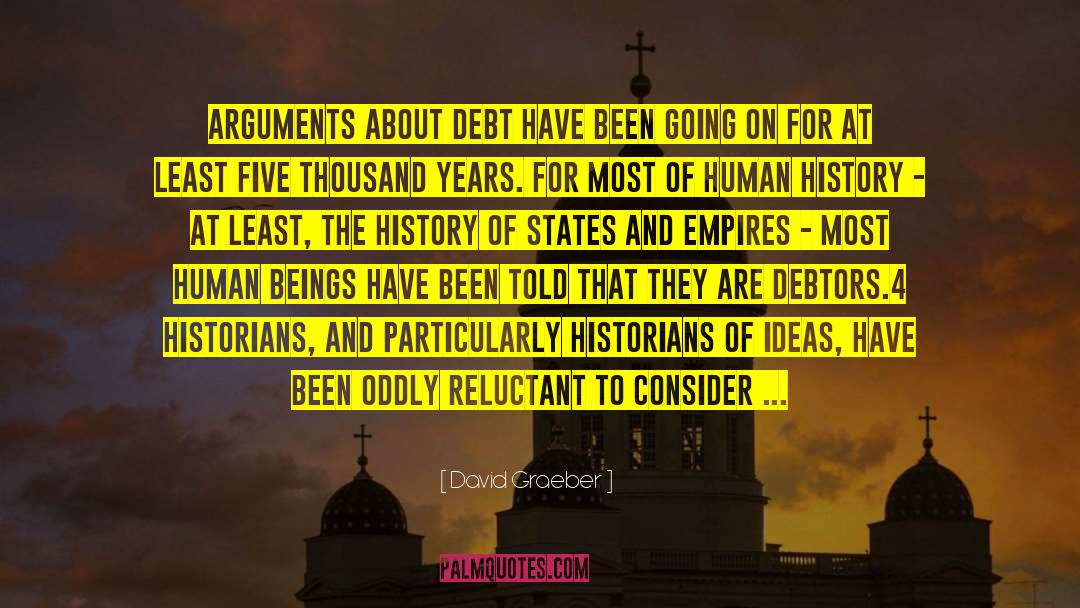
In other words if a man is armed, then one pretty much has to take his opinions into account. One can see how this worked at its starkest in Xenophon's Anabasis, which tells the story of an army of Greek mercenaries who suddenly find themselves leaderless and lost in the middle of Persia. They elect new officers, and then hold a collective vote to decide what to do next. In a case like this, even if the vote was 60/40, everyone could see the balance of forces and what would happen if things actually came to blows. Every vote was, in a real sense, a conquest.
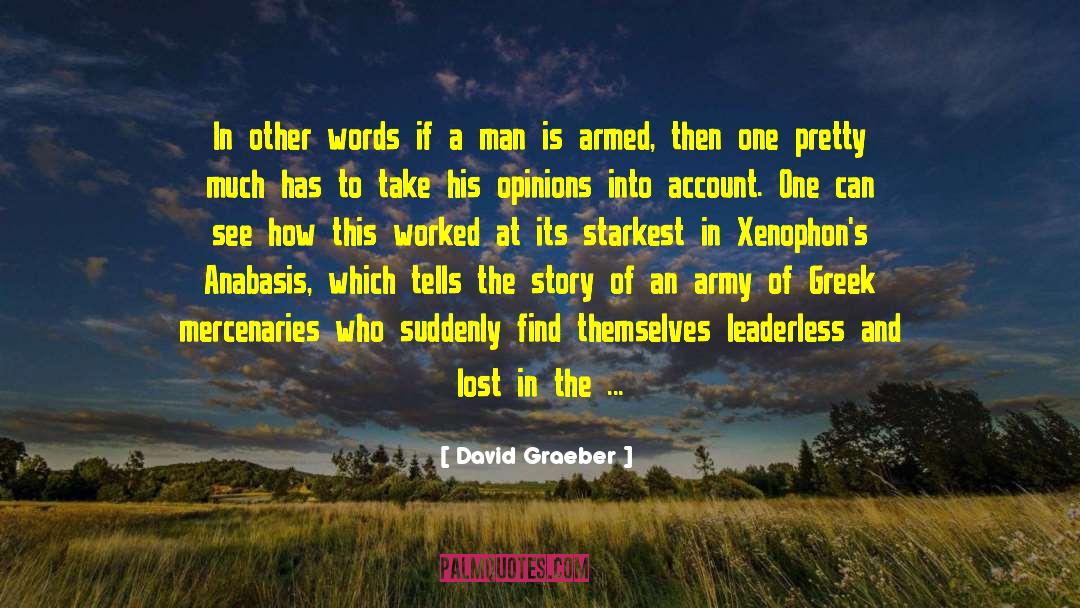
As it turns out, we don't "all" have to pay our debts. Only some of us do.

Police are bureaucrats with weapons.

Debt is the most effective way to take a relation of violent subordination and make the victims feel that it's their fault.
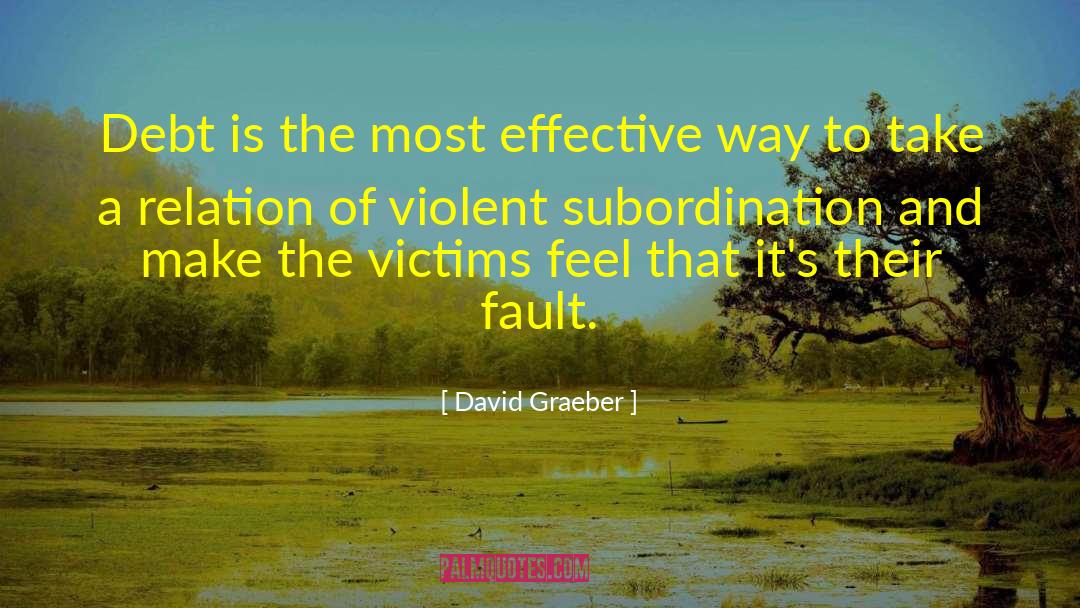
Most Amazonians don't want to give others the power to threaten them with physical injury if they don't do as they are told. Maybe we should better be asking what it says about ourselves that we feel this attitude needs any sort of explanation.
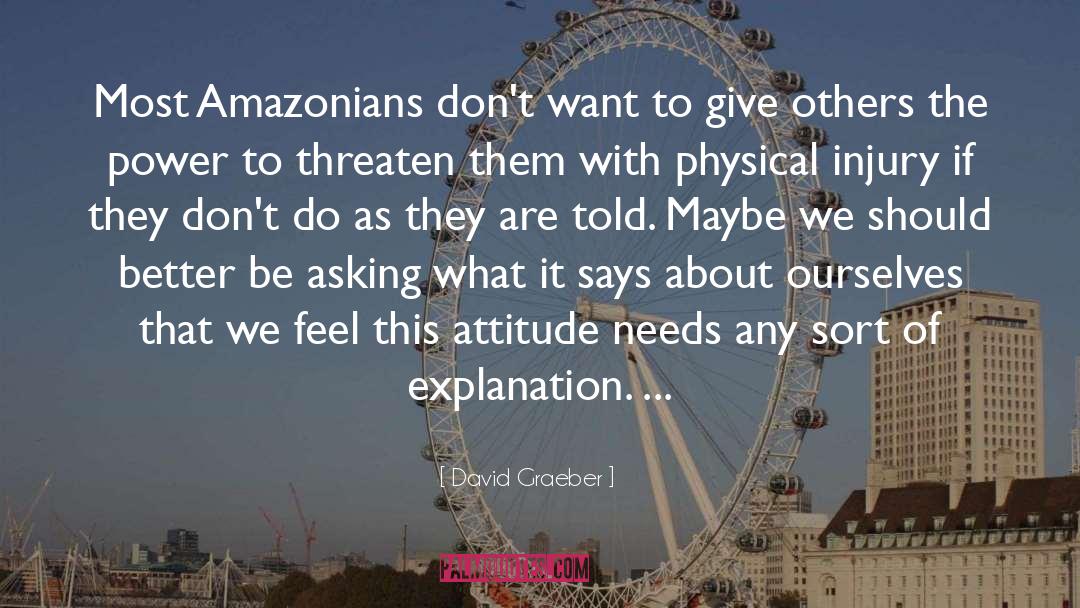
the taste for Victorian-era sci-fi futures is more than anything else a nostalgia for the last moment, before the carnage of World War I, when everyone could safely feel a redemptive future was possible.

